#strata-cut
Explore tagged Tumblr posts
Text




more strata cut animation from the music video for Big Time by Peter Gabriel (x)
5 notes
·
View notes
Note
yes ma’am i will fuck off (i promis im joketing pls also pologizes i didnt know it was a slur)
Im a man.
-Jotaro
(LMAO ITS FINE))//Mod
#jotaro kujo#jojo ask blog#jojos bizarre adventure#ask blog#its also a rock formation#tag yourself im an intrusion of igneous rock cutting across existing strata
5 notes
·
View notes
Text

eugh
#following this. caesar = the state-body-victim = rome. which is adding some amount of weight to the monarch-behavior accusations#hey anyway do you know what i hate. the justice-legal system of the late republic#it's like playing 4D chess in an arena made of teeth#cassius dio coming in strong with the condemnation that trebonius got what he had coming is interesting to me#because nothing about what happened to trebonius looks or behaves in a roman way. justice-retribution wise#THEN AGAIN from the alternative court. his role in the death of caesar puts him down with the lowest strata of criminals#BUT TO COUNTER THAT caesar's intentions wrt to provinces and appointments were being honored so at what point are we cutting#up the corpse of caesar along with everyone else#so sorry if you read these tags im discussing like. 3 different books ive read today and referencing exactly none of them#im having a conversation with myself. everything that happened after 44BCE sucks to interpret
4 notes
·
View notes
Text
What is clearly a fae woman: "May I have your name?"
Me: "Joe."
Fae Woman: "May I have your full name, please?"
Me: "Joe Mama."
Fae Woman: Shrill unholy cries as she Strata-Cut Animations away into oblivion
3 notes
·
View notes
Text
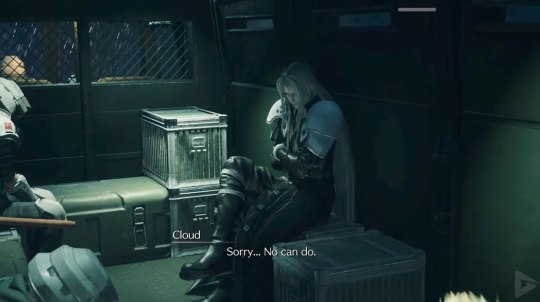
The second episode of the Remake, FF7 Rebirth, has proven to be a terrific experience thus far. SE obviously made a few big decisions here and there.
It is seemingly implied now that Jenova wasn't "brain-dead", and it is hinted that Sephiroth was addled during his breakdown.
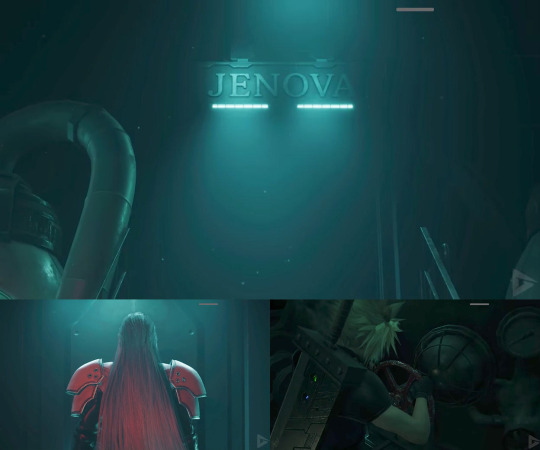
It all begins with a strategically placed cut, when Sephiroth touches the door bearing the name Jenova and instructs "Cloud" to close the valve. The scene is merely functional for new fans, yet leaves a vacant space that Crisis Core players will quickly fill in with the inferred arrival of Genesis. Smart move that, leaving the interpretation to the player. Whether Genesis exists inside the Remake's continuity or not, the moment reads differently to each fan. Quite frankly, I was half-expecting “Cloud” to come across a banora apple, rolling on the floor, but I suppose that would be telling.
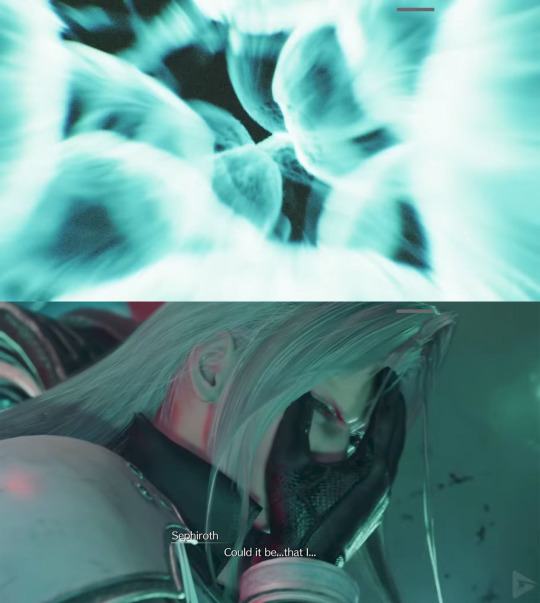
What's remarkable is that they give Sephiroth almost identical symptoms to those that Cloud has in the remake. Glitches and odd headaches superimpose themselves nicely over the original Crisis Core scene. And, as much as I loathe Tyler Hoechlin's acting in the game, he lends a tangible sense of rage to Sephiroth's disparaging remarks about Hojo and his experiments. You can hear the hatred, a touch of pity, and disgust directed at Hojo's work and the creatures he tortured. In Crisis Core, he refers to the test subjects as “abominations” with the same touch of bitterness.
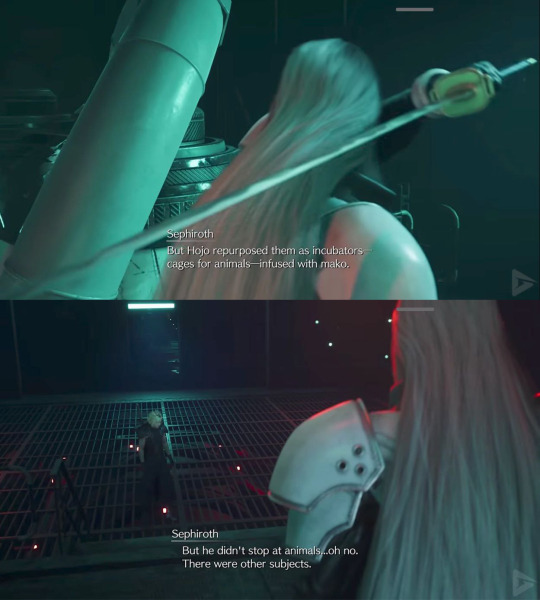
Back to the point: glitches, pupil dilations, and headaches are visual cues for Jenovaroth's influence or proximity, as shown in the first part of the Remake. However, at this point, Sephiroth is still sane — cracking, but still himself — so the only agent who can exert influence on him is, well, Jenova.
Now, a widely established fan hypothesis maintained that Jenova was brain-dead or comatose. Bodily functions sustained, but brain activity plateaued. Rebirth, however, strangely suggests otherwise.
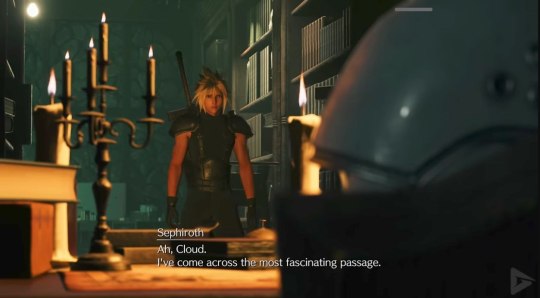
When "Cloud" returns to Sephiroth in the manor's basement for the second time, Sephiroth recites an excerpt from a journal purportedly written by Professor Gast:
“The specimen, found in a strata dating back two thousand years, smiled with what could only be described as 'ethereal grace'… Though the truth eluded me at first, I later determined that she was an Ancient - or a 'steward of the planet', as they are referred to in legend”.
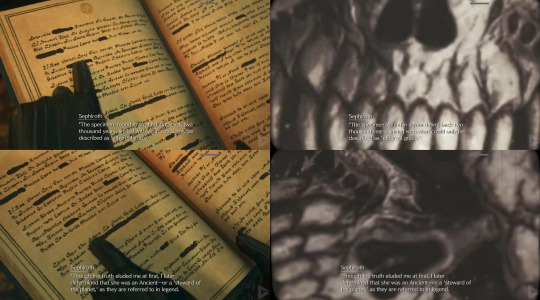
Remembering the battles with Jenova Dreamweaver and Jenova Emergent, the creature is far from "graceful" or "ethereal". There is nothing graceful about her figure in the tube either, and she is not smiling. The game goes out of its way to lampshade the glaring contradiction by showing the flashes of Jenova’s fanged skull and grotesque body as Sephiroth quotes the passage. So how could Gast perceive her as such?.. The answer is most likely found in Jenova Dreamweaver's description given in Ultimania: the entity has the ability to induce hallucinations in individuals who come into proximity with it, which is further corroborated by Jenova Emergent description.
An ancient lifeform that Shinra Company has kept under strict confidentiality. Those who come into contact can have their conscience interfered as well as see illusions. Professor Hojo has dedicated half of his life to researching Jenova, and within the Shinra Company building's top floors lies a secret research center called the "Dome," where Jenova's cells are injected into lifeforms or machinery to conduct experiments. (Ultimania)
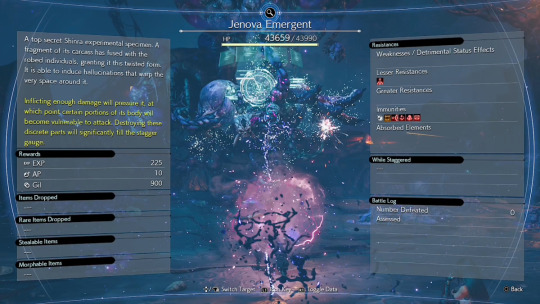
Gast even writes that “the truth eluded him at first”, but LATER he determines the specimen belonged to the race of Ancients, as if that answer was suggested. The implication is chilling: Jenova may have purposefully misled Gast in order to present itself as an Ancient. As Sephiroth later explains in the FF7Rb, Jenova is capable of seeing deep into one's soul and impersonating individuals you fear, love, or hate.
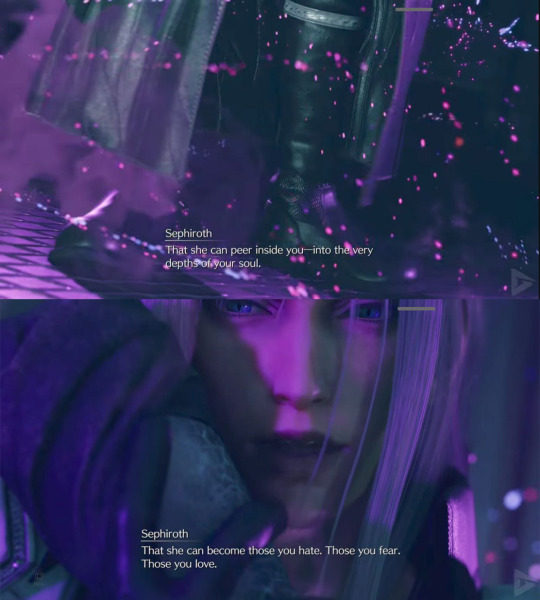
If ShinRA and Gast were determined to unravel the mysteries of Ancients and their Promised Land, it would make sense for Jenova to "scan" Gast and determine the best course of action: disguise itself as an Ancient in order to escape captivity in geological strata jail.
The scene in which Sephiroth reads Gast's notes is possibly the final time he is more or less himself, before Jenova's image intermingles with his for a brief moment. Again, I appreciate Tyler's voice acting in this particular section and the real rage he brought to it. Admittedly, I was concerned that with next-gen visuals, they would take a more gruesome approach, displaying Sephiroth conducting the Nibelheim carnage with sadistic pleasure, but they took a different route. Slow, zombie-like movements, and a glassy expression.
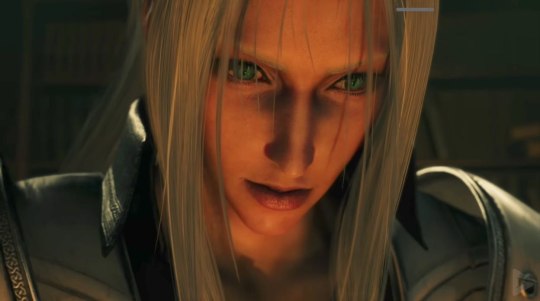
He speared the militiamen as casually as if he were spearing bugs, which is far more frightening from a narrative point. What jumped out was how they emphasized the possessed-like behavior: from snarling and flailing the book like a suffering person to an empty countenance and automaton-like strides, as if he was being beckoned. Which is what "Mother is waiting" implies.
The final segment of the Nibelheim flashback is likely the most essential as well. According to previous developer claims, Sephiroth's will took precedence over Jenova's, and he was in control — whether Jenova was brain-dead or simply of lesser willpower. However, the Rebirth appears to suggest something different right off the bat. First, "Cloud" shouts, "I believed in you… No… Not you — whoever the hell you are!", highlighting the significant personality change and the resulting lack of recognition. But then "Cloud" sees Jenova's image superimposed over that of Sephiroth in a rapid, glitch-like succession.
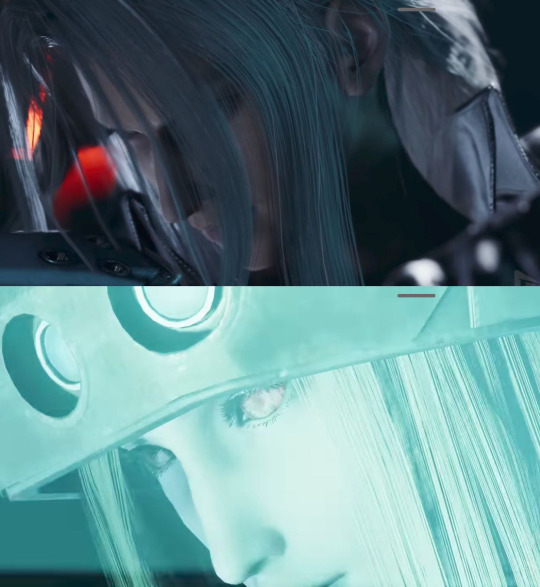
In other words, he sees Jenova inhabiting Sephiroth's body as a vehicle to once again escape the confinements. Whatever that means, whether it suggests that Jenova is in control from the start, or whether Sephiroth is literally the greatest functional agglomeration of her cells, and therefore literally “becomes” Jenova.
If Jenova's original body was severely damaged — either as a result of eons of incarceration or Hojo's tinkering — it stands to reason that, if she wished to carry out her plan, she would need a new body, one capable of moving at the very least. Perhaps Sephiroth, an able-bodied skilled Mako-infused fighter of considerable might, served as a better "vessel" than her original damaged one.
But the crux of the matter lies elsewhere. The possibility of Jenova being conscious and influencing Gast is very terrifying. With the potential to affect others in close vicinity, she may have influenced the minds of the whole science team behind the Jenova Project, particularly those who had long-term contact with her tissue — Gast and Hojo. It could turn out that the whole idea to revive an “Ancient” was planted by Jenova in order to grow itself a powerful host. In fact, if it could "peer into one's soul," i.e. read minds and memories, it might have easily identified a pressure point to indoctrinate people who could forward her objective. It's one thing to inject tissue samples into an adult body; it's quite another to devise a plan to inject cells into a developing human fetus. Who knows. Perhaps Hojo is such an obsessed Jenova nutcase in large part because he fell under its spell; feelings of inadequacy and being overshadowed by his colleague may have offered a crack in his defenses.
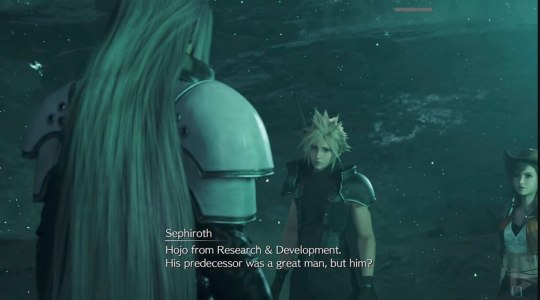
One that Jenova easily took advantage of. After all, as Dirge of Cerberus implies, Hojo ended up implanting himself with alien organic material.
Again, Jenova's power to extract information from an individual when in proximity supports a bleak reading of the events leading up to Nibelheim's ransacking. A person who kept on carrying a photograph of his supposedly late mother and badgered others about his background, as suggested by Ever Crisis episodes, was literally wearing his weakness on a sleeve.
Perhaps the 30-something years of the Jenova Project were supposed to bring Sephiroth there.
Perhaps the chain of events had been nudged in that direction, starting from the very discovery of a derelict non-human lifeform. Nudged by an intelligence both cunning and incomprehensible. And that makes Jenova a much, much scarier presence in the remake than it was ever suggested in OG.
581 notes
·
View notes
Text
there is a reproduced 1909 magazine story in this book I read recently (The Female Economy by Wendy Gamber it is amazing oh my god) that just makes my soul depart my body
it's about a woman who decides to make her own new dress undersleeves to save money, and enlists a dressmaker to do the actual sewing. but she can Totally Cut The Sleeves Out Herself With This Paper Pattern So She's The One Making It Really
for reference as to why this is absolutely insane, cutting/fitting is the single hardest part of Victorian and Edwardian dressmaking. this is where all the Mathing and Thinking and Make Two-Dimensional Shapes Into Three-Dimensional Garments come into play. and contrary to popular belief, while most women at the time were accomplished seamstresses- in the sense of "putting fabric together using stitches, and likely also mending" -they didn't necessarily have a clue how to shape a garment. especially not the highly fitted bodices and imaginative sleeve shapes of the day. custom-made clothes from dressmakers were commonplace for most social strata in urban and suburban areas; even lower-middle and working-class women had "lesser" dressmakers they patronized
you do start seeing commercial patterns and home dressmaking manuals steadily increasing throughout the latter half of the 19th century and the early 20th, but in general there was no reason to assume that a random woman on the street could make herself a properly-fitted gown- or even just sleeves -from scratch. (not even with a pattern, which were notoriously scant on instructions back then)
a modern hobbyist historical costumer probably has more knowledge of how to actually make clothing from 1909 than the average woman living in 1909
so anyway this lady tells the professional dressmaker to stop giving her advice, she's got this, she's FINE HONEST. and then gets pissed at the dressmaker for not telling her she needed to include seam allowance in her pieces
for more reference, that is...
...the absolute most basic Day One sewing knowledge
#sewing#history#I am on the astral plane#someone page instagram user Can You Sew This For Me#edwardian
744 notes
·
View notes
Text
Currently losing my mind a little bit trying to find an alternate name for the Recursive Transform Array/Abstract Convergence Manifold regions in Five Pebbles/Looks to the Moon respectively. I think both names mean roughly the same thing.


(Left: Coils in the Recursive Transform Array, Right: Coils in the Abstract Convergence Manifold)
(Theorizing under the cut)
Both regions contain sets of large transformers (or inductors, they both look like coils) arranged into different groups. I assume the function of this region is to receive power from an iterator's power source (how iterators get their power isn't exactly clear- but at least in Pebbles' case it probably comes from the Linear Systems Rail) and step up or down the voltage so it can be distributed to the different electronic components of an iterator's superstructure as needed.
Stepping up/down voltage is the function of a transformer, which is where I assume the "transform" part of "Recursive Transform Array" comes from. In Moon's case, "abstract" in "Abstract Convergence Manifold" is a synonym for "transform" or "change", one thing is being abstracted, or changed into something else.
"Recursive" means "repeating" (and "repeat" is a synonym of "iterate", funnily enough), so this part probably refers to the multiple similar transformers found in the Recursive Transform Array.
In terms of the Abstract Convergence Manifold, either "convergence" or "manifold" could correspond to the "multiple similar things" meaning. The objects in question are "converging", coming together, or being similar.
"Manifold" is a bit trickier, the general definition means "variety" or "many", but the word has other uses. In typography, it can refer to the process of making copies of a document (via a carbon copy), and in engineering it can refer to a component that distributes gas or liquid to different parts of a system. So in this case, I'm going to assume that "manifold" means "copies" and/or "distribution". This makes sense if the Abstract Convergence Manifold distributes power (or maybe even Void Fluid) to different parts of Moon's structure.
And finally, "array" in "Recursive Transform Array" means a group of things arranged in a pattern. This is also probably what "manifold" in "Abstract Convergence Manifold" means; a group of copies of things.
Based on this, both names basically mean "group of similar/repeating things that change". This might not just refer to the groups of transformer coils, but also to the big square structures that both Pebbles and Moon have in these regions:

(These rooms are very dark, I'm only showing Pebbles' here because it's better lit than Moon's.)
This thing looks like a big computer chip, maybe a Central Processing Unit (CPU). I theorize that this room is where the majority of an iterator's processing takes place; where the actual iteration (in terms of computing: repeating a process) happens. So the things that are repeating and changed could be the actual iterative processes (simulations, thoughts, calculations) are carried out, altered slightly, and repeated again.
(Side tangent: I've always wondered what Pebbles was referring to when he mentioned his "processing strata". It might be layers of processors located in his Recursive Transform Array, possibly in the same big room as the square thing. Personally I think the processing strata are the little blinking lights you can see in the background of this room, but I could be wrong. If anyone actually knows the answer please let me know.)
TL,DR: If you have an iterator OC and you want to give their internal regions names but you don't want to simply copy existing ones, I'm pretty sure the naming convention for the transformer arrays uses synonyms for (similar/repeating) (change) (group). For example, "Sequential Flux Assemblage", "Parallel Modification Cluster". These sound silly, but basically everything iterator-related is silly technobabble, so I think the moral is to have fun with it.
Thank you for reading, and let me know if you have any ideas. I enjoy talking to people about random Rain World theories.
#this is another theory spiral I fell down while trying to flesh out OC lore. enjoy#rain world#iterators#rain world iterator#rw iterator#personal#rain world theory#delta's lore corner
344 notes
·
View notes
Text
WoT Meta: Feudalism, Class, And The Politics of The Wheel of Time
One of my long standing personal annoyances with the fantasy genre is that it often falls into the trap of simplifying feudal class systems, stripping out the interesting parts and the nuance to make something that��s either a lot more cardboard cut-out, or has our modern ideas about class imposed onto it.
Ironically the principal exception is also the series that set the bar for me. As is so often the case, Robert Jordan’s Wheel of Time is unique in how much it works to understand and convey a realistic approach to power, politics, government, rulership, and the world in general–colored neither by cynicism or idealism. How Jordan works the feudal system into his world building is no exception–weaving in the weaknesses, the strengths, and the banal realities of what it means to have a Lord or Lady, a sovereign Queen or King, and to exist in a state held together by interpersonal relationships between them–while still conveying themes and ideas that are, at their heart, relevant to our modern world.
So, I thought I’d talk a little bit about how he does that.
Defining the Structure
First, since we’re talking about feudal class systems, let's define what that means– what classes actually existed, how they related to each other, and how that is represented in Jordan’s world.
But before that, a quick disclaimer. To avoid getting too deep into the historical weeds, I am going to be making some pretty wide generalizations. The phrases ‘most often’, ‘usually’, and ‘in general’ are going to be doing a lot of heavy lifting. While the strata I’m describing is broadly true across the majority medieval and early Renaissance feudal states these things were obviously heavily influenced by the culture, religion, geography, and economics of their country–all of which varied widely and could shift dramatically over a surprisingly small amount of time (sometimes less than a single generation). Almost nothing I am going to say is universally applicable to all feudal states, but all states will have large swathes of it true for them, and it will be widely applicable. The other thing I would ask you to keep in mind is that a lot of our conceptions of class have been heavily changed by industrialization. It’s impossible to overstate how completely the steam engine altered the landscape of socio-politics the world over, in ways both good and bad. This is already one of those things that Jordan is incredibly good at remembering, and that most fantasy authors are very good at forgetting.
The disparity between your average medieval monarch’s standard of living and their peasants was pretty wide, but it was nothing compared to the distance between your average minimum wage worker and any billionaire; the monarch and the peasant had far more in common with each other than you or I do with Jeff Bezos or Mike Zuckerberg. The disparity between most people’s local country lord and their peasants was even smaller. It was only when the steam engine made the mass production of consumer goods possible that the wealth gap started to become a chasm–and that was in fact one of the forces that lead to the end of the feudal system and the collapse of many (though by no means all) of the ruling monarchies in Europe. I bring this up because the idea of a class system not predicated on the accumulation of capital seems pretty alien to our modern sensibilities, but it was the norm for most of history. Descent and birth mattered far more than the riches you could acquire–and the act of accumulating wealth was itself often seen as something vulgar and in many countries actively sinful. So with that in mind, what exactly were the classes of feudalism, and how do they connect to the Wheel of Time?
The Monarch and their immediate family unsurprisingly occupied the top of the societal pyramid (at least, in feudal states that had a monarch and royal family- which wasn’t all of them). The Monarch was head of the government and was responsible for administering the nation: collecting taxes, seeing them spent, enforcing law, defending the country’s borders and vassals in the event of war, etc. Contrary to popular belief, relatively few monarchs had absolute power during the medieval period. But how much power the monarch did have varied widely- some monarchs were little more than figureheads, others were able to centralize enough power on themselves to dictate the majority of state business- and that balance could shift back and forth over a single generation, or even a single reign depending on the competence of the monarch.
The royal family usually held power in relation to their monarch, but also at the monarch’s discretion. The more power a monarch had, the more likely they were to delegate it to trusted family members in order to aid with the administration of the realm. This was in both official and unofficial capacities: princes were often required to do military service as a right of passage, and to act as diplomats or officials, and princesses (especially those married into foreign powers) were often used as spies for their home state, or played roles in managing court affairs and business on behalf of the ruler.
Beneath the monarch and their family you get the noble aristocracy, and I could write a whole separate essay just on the delineations and strata within this group, but suffice to say the aristocracy covers individuals and families with a wide range of power and wealth. Again, starting from that country lord whose power and wealth in the grand scheme of things is not much bigger than his peasants, all the way to people as powerful, or sometimes more powerful, than the monarch.
Nobles in a feudal system ruled over sections of land (the size and quality usually related sharply to their power) setting taxes, enforcing laws, providing protection to the peasants, hearing petitions, etc. within their domains. These nobles were sometimes independent, but more often would swear fealty to more powerful nobles (or monarchs) in exchange for greater protection and membership in a nation state. Doing so meant agreeing to pay taxes, obey (and enforce) the laws of the kingdom, and to provide soldiers to their liege in the event of war. The amount of actual power and autonomy nobles had varied pretty widely, and the general rule of thumb is that the more powerful the monarch is, the less power and autonomy the nobles have, and vice versa. Nobles generally were expected to be well educated (or at least to be able to pretend they were) and usually provided the pool from which important government officials were drawn–generals, council members, envoys, etc–with some kingdoms having laws that prevented anyone not of noble descent from occupying these positions.
Beneath the nobles you get the wealthy financial class–major merchants, bankers, and the heads of large trade guilds. Those Marx referred to generally as the bourgeoisie because they either own means of production or manage capital. In a feudal system this class tended to have a good bit of soft power, since their fortunes could buy them access to circles of the powerful, but very little institutional power, since the accumulation and pursuit of riches, if anything, was seen to have negative moral worth. An underlying presumption of greediness was attached to this class, and with it the sense that they should be kept out of direct power.
That was possible, in part, because there weren't that many means of production to actually own, or that much capital to manage, in a pre-industrial society. Most goods were produced without the aid of equipment that required significant capital investment (a weaver owned their own loom, a blacksmith owned their own tools, etc), and most citizens did not have enough wealth to make use of banking services. This is the class of merchants who owned, but generally didn’t directly operate, multiple trading ships or caravans, guild leaders for craftsfolk who required large scale equipment to do their work (copper and iron foundries for the making of bells, for example), and bankers who mainly served the nobility and other wealthy individuals through the loaning and borrowing of money. This usually (but not always) represented the ceiling of what those not born aristocrats could achieve in society.
After that you get middling merchants, master craftsfolk and specialty artisans, in particular of luxury goods. Merchants in this class usually still directly manage their expeditions and operations, while the craftsfolk and artisans are those with specialty skill sets that can not be easily replicated without a lifetime of training. Master silversmiths, dressmakers, lacquer workers, hairdressers, and clockmakers are all found in this class. How much social clout individuals in this class have usually relates strongly to how much value is placed on their skill or product by their society (think how the Seanchan have an insatiable appetite for lacquer work and how Seanchan nobles make several Ebou Dari lacquer workers very rich) as well as the actual quality of the product. But even an unskilled artisan is still probably comfortable (as Thom says, even a bad clockmaker is still a wealthy man). Apprenticeships, where children are taught these crafts, are thus highly desired by those in lower classes,as it guaranteed at least some level of financial security in life.
Bellow that class you find minor merchants (single ship or wagon types), the owners of small businesses (inns, taverns, millers etc), some educated posts (clerks, scribes, accountants, tutors) and most craftsfolk (blacksmiths, carpenters, bootmakers, etc). These are people who can usually support themselves and their families through their own labor, or who, in the words of Jin Di, ‘work with their hands’. Most of those who occupy this class are found in cities and larger towns, where the flow of trade allows so many non-food producers to congregate and still (mostly) make ends meet. This is why there is only one inn, one miller, one blacksmith (with a single apprentice) in places like Emond’s Field: most smaller villages can not sustain more than a handful of non-food producers. This is also where you start to get the possibility of serious financial instability; in times of chaos it is people at this tier (and below) that are the first to be forced into poverty, flight, or other desperate actions to survive.
Finally, there is the group often collectively called ‘peasants’ (though that term is also sometimes used to mean anyone not noble born). Farmers, manual laborers, peddlers, fishers- anyone who is unlikely to be able to support more than themselves with their labor, and often had to depend on the combined labor of their spouse and families to get by. Servants also generally fit into this tier socially, but it’s important to understand that a servant in say, a palace, is going to be significantly better paid and respected than a maid in a merchant's house. This class is the largest, making up the majority of the population in a given country, and with a majority of its own number being food-producers specifically. Without the aid of the steam engine, most of a country’s populace needs to be producing food, and a great deal of it, in order to remain a functional nation. Most of the population as a result live in smaller spread out agrarian communities, loosely organized around single towns and villages. Since these communities will almost always lack access to certain goods or amenities (Emond’s Field has a bootmaker, but no candlemaker, for example) they depend on smalltime traders, called peddlers, to provide them with everyday things, who might travel from town to town with no more than a single wagon, or even just a large pack.
The only groups lower than peasants on the social hierarchy are beggars, the destitute, and (in societies that practice slavery) slaves. People who can not (or are not allowed to) support themselves, and instead must either eke out a day to day existence from scraps, or must be supported by others. Slaves can perform labor of any kind, but they are regarded legally as a means of production rather than a laborer, and the value is awarded to their owner instead.
It’s also worth noting that slavery has varied wildly across history in how exactly it was carried out and ran the gamut from the trans-Atlantic chattel slavery to more caste or punitive-based slavery systems where slaves could achieve freedom, social mobility, or even some degree of power within their societies. But those realities (as with servants) had more to do with who their owners were than the slave’s own merit, and the majority of slaves (who are almost always seen as less than a freedman even when they are doing the same work) were performing the same common labor as the ‘peasant’ class, and so viewed as inferior.
Viewing The Wheel of Time Through This Lens
So what does all this have to do with Robert Jordan’s Wheel of Time? A lot actually, especially compared to his contemporaries in fantasy writing. Whereas most fantasy taking place in feudal systems succumbs to the urge to simplify matters (sometimes as far down to their only being two classes, ‘peasant’ and ‘royalty’) Jordan much more closely models real feudalism in his world.
The majority of the nations we encounter are feudal monarchies, and a majority of each of their populations are agrarian farming communities overseen by a local lord or other official. How large a nation’s other classes are is directly tied to how prosperous the kingdom is, which is strongly connected to how much food and how many goods the kingdom can produce on the available land within it. This in turn, is tightly interdependent on how stable the kingdom is and how effective its government is.
Andor is the prime example: a very large, very prosperous kingdom, which is both self-sufficient in feeding itself via its large swathes of farmland (so much so that they can afford to feed Cairhien through selling their surplus almost certainly at next to no profit) and rich in mineral wealth from mines in the west. It is capable of supporting several fairly large cities even on its outskirts, as well as the very well-developed and cosmopolitan Caemlyn as its capital. This allows Andor to maintain a pretty robust class of educated workers, craftsfolk, artisans, etc, which in turn furthers the realm’s prosperity. At the top of things, the Queen presides over the entire realm with largely centralized power to set laws and taxes. Beneath her are the ‘great houses’–the only Houses in Andor besides the royal house who are strong enough that other nobles ‘follow where they lead’ making them the equivalent of Duchesses and Dukes, with any minor nobles not sworn directly to the Queen being sworn to these ten.
And that ties into something very important about the feudal system and the impact it had on our world and the impact it has on Jordan's. To quote Youtuber Jack Rackham, feudalism is what those in the science biz would call an unstable equilibrium. The monarch and their vassals are constantly in conflict with each other; the vassals desiring more power and autonomy, as the monarch works to centralize power on themselves. In feudalism there isn’t really a state army. Instead the monarch and the nobles all have personal armies, and while the monarch’s might be stronger than anyone else’s army, it’s never going to be stronger than everybody else’s.
To maintain peace and stability in this situation everyone has to essentially play Game of Thrones (or as Jordan called it years before Martin wrote GoT, Daes Dae’mar) using political maneuvering, alliances, and scheming in order to pursue their goals without the swords coming out, and depending on the relative skill of those involved, this can go on for centuries at a time….or break apart completely over the course of a single bad summer, and plunge the country into civil war.
Cairhien is a great example of this problem. After losing the Aiel War and being left in ruins, the monarch who ultimately secured the throne of Cairhien, Galldrian Riatin, started from a place of profound weakness. He inherited a bankrupt, war torn and starving country, parts of which were still actively on fire at the time. As Thom discusses in the Great Hunt, Galddrian's failure to resettle the farmers displaced by the war left Cairhien dependent on foreign powers to feed the populace (the grain exports from Tear and Andor) and in order to prevent riots in his own capital, Galldrian choose bread and circuses to keep the people pacified rather then trying to substantially improve their situation. Meanwhile, the nobles, with no effective check on them, began to flex their power, seeing how much strength they could take away from each other and the King, further limiting the throne’s options in how to deal with the crisis, and forcing the King to compete with his most powerful vassals in order to just stay on the throne. This state of affairs ultimately resulted, unsurprisingly, in one of Galladrin’s schemes backfiring, him ending up dead, and the country plunging into civil war, every aristocrat fighting to replace him and more concerned with securing their own power then with restoring the country that was now fully plunged into ruin.
When Dyelin is supporting Elayne in the Andoran Succession, it is this outcome (or one very much like it) that she is attempting to prevent. She says as much outright to Elayne in Knife of Dreams–a direct succession is more stable, and should only be prevented in a situation where the Daughter Heir is unfit–through either incompetence or malice–to become Queen. On the flip side, Arymilla and her lot are trying to push their own agendas, using the war as an excuse to further enrich their Houses or empower themselves and their allies. Rhavin’s machinations had very neatly destabilized Andor, emboldening nobles such as Arymilla (who normally would never dream of putting forward a serious claim for the throne) by making them believe Morgase and Trakand were weak and thus easy to take advantage of.
We also see this conflict crop up as a central reason Murandy and Altara are in their current state as well. Both are countries where their noble classes have almost complete autonomy, and the monarch is a figurehead without significantly more power than their vassals (Tylin can only keep order in Ebou Dar and its immediate surrounding area, and from what she says her father started with an even worse deal,with parts of the capital more under the control of his vassals than him). Their main unifying force is that they wish to avoid invasion and domination by another larger power (Andor for Murandy, Illian and Amadica for Altara) and the threat of that is the only thing capable of bringing either country into anything close to unity.
Meanwhile a lack of centralization has its trade offs; people enjoy more relative freedoms and social mobility (both depend heavily on trade, which means more wealth flowing into their countries but not necessarily accumulating at the top, due to the lack of stability), and Altara specifically has a very robust ‘middle class’ (or as near as you can get pre-industrialization) of middling to minor merchants, business and craftsfolk, etc. Mat’s time in Ebou Dar (and his friendship with Satelle Anan) gets into a lot of this. Think of the many many guilds that call Altara home, and how the husband of an inn owner can do a successful enough business fishing that he comes to own several crafts by his own merit.
On the flip side both countries have problems with violence and lawlessness due to the lack of any enforced uniformity in terms of justice. You might ride a day and end up in land ruled by a Lord or Lady with a completely different idea of what constitutes, say, a capital offense, than the Lord or Lady you were under yesterday. This is also probably why Altara has such an ingrained culture of duels to resolve disputes, among both nobles and common folk. Why appeal to a higher authority when that authority can barely keep the streets clean? Instead you and the person you are in conflict with, on anything from the last cup of wine to who cheated who in a business deal, can just settle it with your knives and not have to bother with a hearing or a petition. It’s not like you could trust it anyways; as Mat informs us, most of the magistrates in Altara do the bidding of whoever is paying their bribes.
But neither Altara nor Murandy represents the extreme of how much power and autonomy nobles can manage to wrangle for themselves. That honor goes to Tear, where the nobles have done away with the monarch entirely to instead establish what amounts to an aristocratic confederacy. Their ruling council (The High Lords of Tear) share power roughly equally among themselves, and rule via compromise and consensus. This approach also has its tradeoffs: unlike Murandy and Altara, Tear is still able to effectively administer the realm and create uniformity even without a monarch, and they are able to be remarkably flexible in terms of their politics and foreign policy, maintaining trade relationships even with bitter enemies like Tar Valon or Illian. On the flipside, the interests of individual nobles are able to shape policy and law to a much greater extent, with no monarch to play arbiter or hold them accountable. This is the source of many of the social problems in Tear: a higher sense of justice, good, or even just plain fairness all take a back seat to the whims and interest of nobles. Tear is the only country where Jordan goes out of his way, repeatedly, to point out wealth inequality and injustice. They are present in other countries, but Jordan drives home that it is much worse in Tear, and much more obscene.
This is at least in part because there is no one to serve as a check to the nobles, not even each other. A monarch is (at least in theory) beholden to the country as a whole, but each High Lord is beholden only to their specific people, house and interests, and there is no force present that can even attempt to keep the ambitions and desires of the High Lords from dictating everything. So while Satelle Anan's husband can work his way up from a single fishing boat to the owner of multiple vessels, most fisherman and farmers in Tear scrape by on subsistence, as taxes are used to siphon off their wealth and enrich the High Lords. While in Andor ‘even the Queen most obey the law she makes or there is no law’ (to quote Morgase), Tairen Lords can commit murder, rape, or theft without any expectation of consequences, because the law dosen’t treat those acts as crimes when done to their ‘lessers’, and any chance someone might get their own justice back (as they would in Altara) is quashed, since the common folk are not even allowed to own weapons in Tear. As we’re told in the Dragon Reborn, when an innkeeper is troubled by a Lord cheating at dice in the common room, the Civil Watch will do nothing about it and citizens in Tear are banned from owning weapons so there is nothing he can do about it. The best that can be hoped for is that he will ‘get bored and go away’.
On the opposite end, you have the very very centralized Seanchan Empire as a counter example to Tear, so centralized it’s almost (though not quite) managed to transcend feudalism. In Seanchan the aristocratic class has largely been neutered by the monarchy, their ambitions and plots kept in check by a secret police (the Seekers of Truth) and their private armies dwarfed by a state army that is rigorously kept and maintained. It’s likely that the levies of the noble houses, if they all united together, would still be enough to topple the Empress, but the Crystal Throne expends a great deal of effort to ensure that doesn't happen,playing the nobles against each other and taking advantage of natural divisions in order to keep them from uniting.
Again, this has pros and cons. The Seanchan Empire is unquestionably prosperous; able to support a ridiculous food surplus and the accompanying flow of wealth throughout its society, and it has a level of equity in its legal administration that we don’t see anywhere else in Randland. Mat spots the heads of at least two Seanchan nobles decorating the gates over Ebou Dar when he enters, their crimes being rape and theft, which is a far cry from the consequence-free lives of the Tairen nobles. Meanwhile a vast state-sponsored bureaucracy works to oversee the distribution of resources and effective governance in the Empress’s name. No one, Tuon tells us proudly, has to beg or go hungry in the Empire. But that is not without cost.
Because for all its prosperity, Seanchan society is also incredibly rigid and controlling. One of the guiding philosophies of the Seanchan is ‘the pattern has a place for everything and everything’s place should be obvious on sight’. The classes are more distinct and more regimented than anywhere else we see in Randland. The freedoms and rights of everyone from High Lords to common folk are curtailed–and what you can say or do is sharply limited by both social convention and law. The Throne (and its proxies) are also permitted to deprive you of those rights on nothing more than suspicion. To paraphrase Egeanin from TSR: Disobeying a Seeker (and presumably any other proxy of the Empress) is a crime. Flight from a Seeker is a crime. Failure to cooperate fully with a Seeker is a crime. A Seeker could order a suspected criminal to go fetch the rope for their own binding, and the suspected criminal would be expected to do it–and likely would because failure to do anything else would make them a criminal anyway, whatever their guilt or innocence in any other matter.
Meanwhile that food surplus and the resulting wealth of the Empire is built on its imperialism and its caste-based slavery system, and both of those are inherently unsustainable engines. What social mobility there is, is tied to the Empire’s constant cycle of expand, consolidate, assimilate, repeat–Egeanin raises that very point early on, that the Corenne would mean ‘new names given and the chance to rise high’. But that cycle also creates an endless slew of problems and burning resentments, as conquered populations resist assimilation, the resistance explodes into violence that the Seanchan must constantly deal with–the ‘near constant rebellions since the Conquest finished’ that Mat mentions when musing on how the Seanchan army has stayed sharp.
The Seanchan also practice a form of punitive and caste-based slavery for non-channelers, and chattel slavery for channelers. As with the real-life Ottoman Empire, some da’covale enjoy incredible power and privilege in their society, but they (the Deathwatch Guard, the so’jhin, the Seekers) are the exception, not the rule. The majority of the slaves we encounter are nameless servants, laborers, or damane. While non-channelers have some enshrined legal protections in how they can be treated by their masters and society as a whole, we are told that emancipation is incredibly rare, and the slave status is inherited from parent to child as well as used as a legal punishment–which of course would have the natural effect of discouraging most da’covale from reproducing by choice until after (or if) they are emancipated–so the primary source for most of the laborers and servants in Seanchan society is going to be either people who are being punished or who choose to sell themselves into slavery rather then beg or face other desperate circumstances.
This keeps the enslaved population in proportion with the rest of society only because of the Empire’s imperialism- that same cycle of expand, consolidate, assimilate, repeat, has the side effect of breeding instability, which breeds desperation and thus provides a wide pool to draw on of both those willing to go into slavery to avoid starvation, and those who are being punished with slavery for wronging the state in some manner. It’s likely the only reason the Empire’s production can keep pace with its constant war efforts: conquered nations (and subdued rebellions) eventually yield up not just the necessary resources, but also the necessary laborers to cultivate them in the name of the state, and if that engine stalls for any sustained length of time (like say a three hundred year peace enforced by a treaty), it would mean a labor collapse the likes of which the Empire has never seen before.
A note on damane here: the damane system is undoubtedly one of chattel slavery, where human beings are deprived of basic rights and person hood under the law for the enrichment of those that claim ownership over them. Like in real life this state of affairs is maintained by a set of ingrained cultural prejudices, carefully constructed lies, and simple ignorance of the truly horrific state of affairs that the masses enjoy. The longevity of channelers insulates the damane from some of the problems of how slavery can be unsustainable, but in the long run it also suffers from the same structural problem: when the endless expansion stops, so too will the flow of new damane, and the resulting cratering of power the Empire will face will put it in jeopardy like nothing has before. There is also the problem that, as with real life chattel slavery, if any one piece of the combination of ignorance, lies, and prejudice starts to fall apart, an abolition movement becomes inevitable–and several characters are setting the stage for just that via the careful spreading of the truth about the sul’dam. Even if the Seanchan successfully put down an abolition movement, doing so will profoundly weaken them in a way that will necessitate fundamental transformation, or ensure collapse.
How Jordan Depicts The Relationships Between Classes
As someone who is very conscious in how he depicts class in his works, it makes sense that Jordan frequently focuses on characters interacting through the barriers of their various classes in different ways. New Spring in particular is a gold mine for this kind of insight.
Take, for example, Moiraine and Siuan’s visit to the master seamstress. A lesser writer would not think more deeply on the matter than ‘Moiraine is nobly born so obviously she’s going to be snobby and demanding, while down-to-earth Siuan is likely to be build a natural rapport and have better relationship her fellow commoner, the seamstress Tamore Alkohima’. But Jordan correctly writes it as the reverse: Tamore Alkohima might not be nobly born, but she is not really a peasant either–rather she belongs to that class of speciality artisans, who via the value placed on her labor and skill, is able to live quite comfortably. Moiraine is much more adept at maneuvering this kind of possibly fraught relationship than Siuan is. Yes, she is at the top of the social structure (all the more so since becoming Aes Sedai) but that does not release her from a need to observe formalities and courtesies with someone who, afterall, is doing something for Moiraine that she can not do for herself, even with the Power. If Moiraine wants the services of a master dressmaker, the finest in Tar Valon, she must show respect for both Tamore Alkohima and her craft, which means submitting to her artistic decisions, as well as paying whatever price, without complaint.
Siuan, who comes from the poor Maule district in Tear, is not used to navigating this kind of situation. Most of those she has dealt with before coming to the Tower were either her equals or only slightly above her in terms of class. She tries to treat Tamore Alkohima initially like she most likely treated vendors in the Maule where everyone is concerned with price, since so many are constantly on the edge of poverty, and she wants to know exactly what she is buying and have complete say over the final product, which is the practical mentality of someone to whom those factors had a huge impact on her survival. Coin wasted on fish a day from going bad, or netting that isn’t the right kind, might have meant the difference between eating that week or not, for a young Siuan and her father.
Yet this this reads as an insult to Tamore Alkohima, who takes it as being treated with mockery, and leads to Moiraine needing to step in to try and smooth things over, and explain to Siuan-
“Listen to me, Siuan and do not argue.” she whispered in a rush. “We must not keep Tamore waiting long. Do not ask after prices: she will tell us after we make our selections. Nothing you buy here will be cheap, but the dresses Tamore sews for you will make you look Aes Sedai as much as the shawl does. And it is Tamore, not Mistress Alkohima. You must observe the properties or she will believe you are mocking her. But try thinking of her as a sister who stands just a little above you. A touch of deference is necessary. Just a touch, but she will tell you what to wear as much as she asks.” “And will the bloody shoe maker tell us what kind of slippers to buy and charge us enough to buy fifty new sets of nets?” “No.” Moiraine said impatiently. Tamore was only arching one eyebrow but her face may as well have been a thunderhead. The meaning of that eyebrow was clear as the finest crystal. They had already made the seamstress wait too long, and there was going to be a price for it. And that scowl! She hurried on, whispering as fast as she could. “The shoemaker will make us what we want and we will bargain the price with him, but not too hard if we want his best work. The same with the glovemaker, the stockingmaker, the shiftmaker, and all the rest. Just be glad neither of us needs a hairdresser. The best hairdressers are true tyrants, and nearly as bad as perfumers.”
-New Spring, Chapter 13: Business in the City.
Navigating the relationship between characters of a different class is something a of a running theme throughout New Spring–from Moiraine’s dealing with the discretion of her banker (‘Another woman who knew well her place in the world’ as Moiraine puts it), to having to meet with peasants during her search for the Dragon Reborn (and bungling several of those interactions), to wading through the roughest criminal parts of Chachin in search of an inn, and frequently needing to resort to the Power to avoid or resolve conflict. Moiraine’s ability to handle these situations is tightly tied to her experience with the people involved prior to her time as a Novice, but all hold up and give color to the class system Jordan presents. It also serves as set up so that when Moraine breaks the properties with a different seamstress near the end of the book, it can be a sign of the rising tension and the complex machinations she and Siuan find themselves in.
Notably, Moiraine and Siuan’s relative skill with working with people is strongly related to their backgrounds: the more Moiraine encounters people outside her lived experience as a noble daughter in Cairhien, the more she struggles to navigate those situations while Siuan is much more effective at dealing with the soldiers during the name-taking sequence (who are drawn mostly from the same class as her–common laborers, farmers, etc), and the people in Chachin, where she secures an lodging and local contacts to help in the search with relative ease.
Trying to navigate these waters is also something that frequently trips up characters in the main series as well, especially with the Two Rivers folk who are, ultimately, from a relatively classless society that does not subscribe to feudal norms (more on that below). All of them react to both moving through a society that does follow those norms, and later, being incorporated into its power structures in different, frequently disastrous ways.
Rand, who is not used to the complicated balance between vassal and monarch (which is all the more complicated as he is constantly adding more and more realms under his banner) finds imposing his will and leading the aristocrats who swear fealty to him incredibly difficult. While his reforms are undoubtedly good for the common folk and the general welfare of the nations he takes over, he is most often left to enforce them with threats and violence, which ultimately fuel resistance, rebellion, and more opposition to him throughout the nations he rules, and has down-the-line bad ripple effects on how he treats others, both noble and not, who disagree with him.
Rand also struggles even with those who sincerely wish to serve and aid him in this context: he is awkward with servants, distant with the soldiers and warriors who swear their lives to him, and even struggles with many of his advisors and allies. Part of that is distrust that plagues him in general, but a big element to it is also his own outsider perspective. The Aiel frequently complain that Rand tries to lead them like a King, but that’s because they assume a wetlander King always leads by edict and command. Yet Rand’s efforts to do that with the Westland nations he takes over almost always backfire or have lasting consequences. Rand is frequently trying to frequently play act at what he thinks a King is and does–and when he succeeds it’s almost always a result of Moiraine or Elayne’s advice on the subject, not his own instincts or preconceptions.
Perrin, meanwhile, is unable to hide his contempt for aristocracy and those that willingly follow them, which leads to him both being frequently derelict in his duties as a Lord, and not treating his followers with a great deal of respect. Nynaeve has a similar problem, where she often tries to ‘instill backbone’ into those lower in the class system then her, then comes to regret it when that backbone ends up turned on her, and her leadership rejected or her position disrespected by those she had encouraged to reject leadership or not show respect to people in higher positions.
Interestingly, it’s Mat that most effectively manages to navigate various inter-class relationships, and who via the Band of the Red Hand builds a pretty equitable, merit-based army. He does this by following a simple rule: treating people how they wish to be treated. He accepts deference when it’s offered, but never demands it. He pushes back on the notion he’s a Lord often, but only makes it a serious bone with people who hold the aristocracy in contempt. He’s earnest in his dealings, fair minded, and good at reading social situations to adapt to how folks expect him to act, and when he breaches those expectations it’s usually a deliberate tactical choice.
This lets him maintain strong friendships with people of all backgrounds and classes– from Princes like Beslan to horse thieves like Chel Vanin. More importantly, it makes everyone under his command feel included, respected, and valued for what they are. Mat has Strong Ideas About Class (and about most things really), but he’s the only Two Rivers character who doesn't seem to be working from an assumption that everyone else ought to live by his ideals. He thinks anyone that buys into the feudal system is mad, but he doesn't actually let that impact how he treats anyone–probably from the knowledge that they think he’s just as mad.
Getting Creative With the Structure
The other thing I want to dig into is the ways in which Jordan, via his understanding of the feudal system, is able to play with it in creative and interesting ways that match his world. Succession is the big one; who rules after the current monarch dies is a massively important matter since it determines the flow of power in a country from one leader to the next. The reason so many European monarchies had primogeniture (eldest child inherits all titles) succession is not because everyone just hated second children, it’s because primogeniture is remarkably stable. Being able to point to the eldest child of the monarch and say them, that one, and their younger sibling if they're not around, and so on is very good for the transition of power, since it establishes a framework that is both easy to understand and very very hard to subvert. Pretty much the only way, historically, to subvert a primogeniture succession is for either the heir’s blood relationship to the monarch or the legitimacy of their parent’s marriage to be called into question.
And yet despite that, few of the countries in Jordan's world actually use primogeniture succession. Andor does, as do some of the Borderlands, but the majority of monarchies in Randland use elective succession, where the monarch is elected from among the aristocratic class by some kind of deliberative body. This is the way things are in Tarabon, Arad Doman,Ghealdan, Illian, and Malkier, who all elect the monarchs (or diarchs in the case of Tarabon- where two rulers, the Panarch and the King, share power) via either special council or some other assembly of aristocrats.
There are three countries where we don’t know the succession type (Arafel, Murandy, and Amadicia) but also one we know for sure doesn't use primogeniture succession: Cairhien. We know this because Moiraine’s claim to the Sun Throne as a member of House Damodred is seen as as legitimate enough for the White Tower to view putting her on the Sun Throne as a viable possibility, despite the fact that she has two older sisters whose claims would be considered superior to her own under primogeniture succession. We never find out for sure in the books what the succession law actually is (the country never stabilizes for a long enough period that it becomes important), but if I had to guess I would guess that it’s designated,where the monarch chooses their successor prior to their death, and that the civil war that followed the Aiel War was the result of both Laman and his designated heir(s) dying at the Bloodsnows (we are told by Moiraine that Laman and both his brothers are killed; likely one of them was the next in line).
One country that we know for sure uses designated succession is Seanchan, where the prospective heir is still chosen from among the children of the Empress, but they are made to compete with each other (usually via murder and plotting) for the monarch’s favor, the ‘best’ being then chosen to become the heir. This very closely models how the Ottoman Empire did succession (state sanctioned fratricide) and while it has the potential to ensure competence (by certain metrics, anyways) it also sows the seeds of potential instability by ensuring that the monarch is surrounded by a whole lot of people with bad will to them and feelings of being cheated or snubbed in the succession, or else out for vengeance for their favored and felled candidate. Of course, from the Seanchan’s point of view this is a feature not a bug: if you can’t win a civil war or prevent yourself from being assassinated, then you shouldn’t have the throne anyways.
Succession is far from the only way that Jordan plays with the feudal structure either. Population is something else that is very present in the world building, even though it’s only drawn attention to a handful of times. In our world, the global population steadily and consistently rose throughout the middle ages and the Renaissance (with only small dips for things like the plague and the Mongol Invasion), then exploded with the Industrial Revolution and has seen been on a meteoric climb year over year (something that may just now be stabilizing into an equilibrium again, only time will tell). This is one of the pressures that led to the collapse of feudalism in the real world, as a growing aristocratic class was confronted with finite land and titles, while at the same time the growing (and increasingly powerful) wealthy financial class of various countries were beginning to challenge the traditions and laws that kept them out of direct power. If you’ve ever read a Jane Austen novel (or really anything from the Georgian/Regency/Victorian eras) this tension is on display. The aristocratic class had never been as secure as people think, but the potential to fall into poverty and ruin had never been a greater threat, which had ripple effects for the stability of a nation, and in particular a monarch who derived much of their power from the fealty of their now-destabilized vassals.
In Jordan’s world however, we are told as early as The Great Hunt that the global population is steadily falling, and has been since the Hundred Years’ War (at least). No kingdom is able to actually control all the territory it has on a map, the size of armies have in particular shrunk consistently (to the point where it’s repeatedly commented on that the armies Rand puts together, some of no more than a few thousand, are larger than any ‘since Artur Hawkwing's day’), large swathes of land lay ungoverned and even more uninhabited or settled. Entire kingdoms have collapsed due to the inability of their increasingly small populations to hold together. This is the fate of many of the kingdoms Ingtar talks about in the Great Hunt: Almoth, Gabon, Hardan, Moredo, Caralain, to name just a few. They came apart due to a combination of ineffective leadership, low population, and a lack of strong neighbors willing or able to extend their power and stability over the area.
All of this means that there is actually more land than there are aristocrats to govern it; so much so that in places like Baerlon power is held by a crown-appointed governor because no noble house has been able to effectively entrench in the area. This has several interesting effects on the society and politics of Randland: people in general are far more aware of the fragility of the nation state as a idea then they would be otherwise, and institutions (even the intractable and mysterious White Tower) are not viewed by even their biggest partisans as invulnerable or perpetual. Even the most powerful leaders are aware, gazing out constantly, as they do, at the ruins of the hundreds of kingdoms that have risen and fallen since the Breaking of the World (itself nothing more, to their understanding, then the death of the ultimate kingdom) that there are no guarantees, no promises that it all won’t fall apart.
This conflict reflects on different characters in different ways, drawing out selfishness and cowardice from some, courage and strength from others. This is a factor in Andor’s surprisingly egalitarian social climate: Elayne and Morgase both boast that Andorans are able to speak their minds freely to their leaders about the state of things, and be listened to, and even the most selfish of leaders like Elenia Sarand are painfully aware that they stand on a tower built from ‘the bricks of the common folk’, and make a concentrated effort to ensure their followers feel included and heard. Conversely it also reflects on the extremely regimented culture of the Borderlands, were dereliction of duty can mean not just the loss of your life, but the loss of a village, a town, a city, to Trolloc raids (another pressure likely responsible for slow and steady decline of the global population).
The Borderlanders value duty, honor, and responsibility above all else, because those are the cornerstones holding their various nations together against both the march of time and the Blight. All classes place a high value on the social contract; the idea that everyone must fulfill their duty to keep society safe is a lot less abstract when the stakes are made obvious every winter through monsters raiding your towns. This is most obvious in both Hurin and Ingtar’s behavior throughout The Great Hunt: Hurin (and the rest of the non-noble class) lean on the assurance that the noble class will be responsible for the greater scale problems and issues in order to endure otherwise unendurable realities, and that Rand, Ingtar, Aglemar, Lan (all of whom he believes to be nobly born) have been raised with the necessary training and tools to take charge and lead others through impossible situations and are giving over their entire lives in service to the people. In exchange Hurin pays in respect, obedience, and (presumably) taxes. This frees Hurin up to focus on the things that are decidedly within his ken: tracking, thief taking, sword breaking, etc, trusting that Ingtar, and later Rand, will take care of everything else.
When Hurin comes up against the feudal system in Cairhien, where the failures of everyone involved have lead to a culture of endless backstabbing and scheming, forced deference, entitlement, and mutual contempt between the parties, he at first attempts to show the Cairhienin ‘proper’ behavior through example, in the hopes of drawing out some shame in them. But upon realizing that no one in Cairhien truly believes in the system any longer after it has failed the country so thoroughly (hence the willingness of vassals to betray their masters, and nobles to abandon their oaths–something unthinkable in the Borderlands) he reverts to his more normal shows of deference to Rand and Ingtar, abandoning excessive courtesy in favor of true fealty.
Ingtar (and later Rand) feel the reverse side of this: the pressure to be the one with the answers, to hold it all together, to be as much icon and object as living person, a figure who people can believe in and draw strength from when they have none of their own remaining, and knowing at the same time that their choices will decide the fates and lives of others. It’s no mistake that Rand first meets Hurin and begins this arc in the remains of Hardan, one of those swept-away nations that Ingtar talks about having been left nothing more than ‘the greatest stone quarry for a hundred miles’. The stakes of what can happen if they fail in this duty are made painfully clear from the start, and for Rand the stakes will only grow ever higher throughout the course of the series, as number of those ‘under his charge’ slides to become ‘a nation’ then ‘several nations’ and finally ‘all the world’. And that leads into one of the problems at the heart of Rand’s character arc.
This emphasis on the feudal contract and duty helps the Borderlands survive the impossible, but almost all of them (with the exception of Saldaea) practice cultures of emotional repression and control,spurning displays of emotion as a lack of self-control, and viewing it as weakness to address the pains and psychological traumas of their day to day lives. ‘Duty is heavier than a mountain, death lighter than a feather’, ‘There will be time to sleep when you’re dead’, ‘You can care for the living or mourn the dead, you cannot do both’: all common sayings in the Borderlands. On the one hand, all of these emphasize the importance of fulfilling your duty and obligations…but on the other, all also implicitly imply the only true release from the sorrows and wounds taken in the course of that duty is death. It is this, in part, that breaks Ingtar: the belief that only the Borderlands truly understand the existential threat, and that he and those like him are suffering and dying for ‘soft southlanders’ whose kingdoms are destined to go to ruin anyways. It’s also why he reveals his suffering to Rand only after he has decided to die in a last stand–he is putting down the mountain of his trauma at last. This is also one of those moments in the books that is a particular building block on the road to Rand’s own problems with not expressing his feelings or being willing to work through his trauma, that will swing back around to endanger the same world he is duty-bound to protect.
I also suspect strongly that this is the source of the otherwise baffling Saldean practice of….what we will call dedicated emotional release. One of the core cultural Saldean traits (and something that is constantly tripping up Perrin in his interactions with Faile) is that Saldeans are the only Borderlanders to reject the notion that showing emotion is weakness. In fact, Saldeans in general believe that shows of anger, passion, sorrow, ardor–you name it–are a sign of both strength and respect. Your feelings are strong and they matter, and being willing to inflict them on another person is not a burden or a betrayal of duty, it’s knowing that they will be strong enough to bear whatever you are feeling. I would hesitate to call even the Saldaens well-adjusted (I don’t know that there is a way to be well-adjusted in a society at constant war), but I do think there is merit to their apparent belief in catharsis, and their resistance to emotional repression as a sign of strength. Of course, that doesn't make their culture naturally better at communication (as Faile and Perrin’s relationship problems prove) but I do think it plays a part in why Bashere is such a good influence on Rand, helping push him away from a lot of the stoic restraint Rand has internalized from Lan, Ingtar, Moiraine, et al.
It also demonstrates that a functioning feudal society is not dependent on absolute emotional repression, or perfect obedience. Only mutual respect and trust between the parties are necessary–trust that the noble (or monarch) will do their best in the execution of their duties, and trust that the common folk in society will in turn fulfill their roles to the best of their ability. Faile’s effectiveness as Perrin’s co-leader/second in command is never hindered or even implied to be hindered by her temperament or her refusal to hide/repress her emotions. She is arguably the one who is doing most of the actual work of governing the Two Rivers after she and Perrin are acclaimed their lord and lady: seeing to public works projects, settling disputes, maintaining relationships with various official groups of their subjects.
The prologue from Lord of Chaos (a favorite scene of mine of the books) where Faile is holding public audience while Perrin is off sulking ‘again’ is a great great example of this; Faile is the quintessential Borderland noble heir, raised all her life in the skills necessary to run a feudal domain, and those skills are on prime display as she holds court. But that is not hindered by her willingness to show her true feelings, from contempt of those she thinks are wasting her time, to compassion and empathy to the Wisdoms who come to her for reassurance about the weather. This is one of those things that Perrin has to learn from her over the course of the series–that simply burying his emotions for fear they might hurt others is not a healthy way to go about life, and it isn’t necessary to rule or lead either. His prejudices about what constitutes a ‘good’ Lord (Lan, Agelmar, Ingtar) and a ‘bad’ one (literally everyone else) are blinding him, showing his lack of understanding of the system that his people are adopting, and his role in it.
Which is a nice dovetail with my next bit–
Outsiders And the Non-Feudal State
Another way Jordan effectively depicts the Feudal system is by having groups who decidedly do not practice it be prominent throughout the series–which is again accurate to real life history, where feudalism was the mode of government for much of (but by no means all) of Medieval and Renaissance Europe, but even in Europe their were always societies doing their own thing, and outside of it, different systems of government flourished in response to their environments and cultures; some with parallels to Feudalism, many completely distinct.
The obvious here are the Aiel who draw on several different non-feudal societies (the Scottish Highland Clans, the Iroquois Confederation, the Mongols, and the Zulu to name just a few) and the Seafolk (whose are a combination of the Maori and the Republic of Piracy of all things), but also firmly in these categories are groups like the communities in the Black Hills, Almoth Plain, and the Two Rivers.
Even though it’s an agrarian farming community made up primarily of small villages, the Two Rivers is not a feudal state or system. We tend to forget this because it looks a lot like our notion of a classic medieval European village, which our biases inherently equate to feudal, but Jordan is very good at remembering this is not the case, and that the Two Rivers folk are just as much outsiders to these systems as the Aiel, or the Seafolk.
Consider how often the refrain of ‘don’t even know they’re part of the Kingdom of Andor’ is repeated in regards to the Two Rivers, and how much the knowledge of Our Heroes about how things like Kingdoms, courts, war, etc, are little more than fairy tales to the likes of those Two Rivers, while even places unaffected directly by things like the Trakand Succession or the Aiel War are still strongly culturally, economically, and politically impacted.
Instead of deriving power and justice from a noble or even a code of law, power is maintained by two distinct groups of village elders (The Village Council and the Women’s Circle) who are awarded seats based on their standing within the community. These groups provide the day-to-day ordering of business and resolving of conflicts, aiding those in need and doing what they can for problems that impact the entire community. The Wisdom serves as the community physician, spiritual advisor, and judge (in a role that resembles what we know of pre-Christian celtic druids), and the Women’s Circle manages most social ceremonies from marriages to betrothals to funerals, as well as presiding over criminal trials (insofar as they even have them). The Mayor manages the village economics, maintaining relationships and arbitrating deals with outsider merchants and peddlers, collecting and spending public funds (through a volunteer collection when necessary, which is how we’re told the new sick house was built and presumably was how the village paid for things like fireworks and gleeman for public festivals), while the Council oversees civil matters like property disputes.
On the surface this seems like an ideal community: idyllic, agrarian, decentralized, where everyone cares more about good food and good company and good harvests than matters of power, politics, or wealth, and without the need for any broader power-structure beyond the local town leaders. It’s the kind of place that luddites Tolkien and Thomas Jefferson envisioned as a utopia (and indeed the Two Rivers it the most Tolkien-y place in Randland after the Ogier stedding, of which we see relatively little), but I think Jordan does an excellent job of not romanticizing this way of life the way Tolkien often did. Because while the Two Rivers has many virtues and a great deal to recommend it, it also has many flaws.
The people in the Two Rivers are largely narrow minded and bigoted, especially to outsiders; The day after Moiraine saves the lives of the entire village from a Trolloc attack, a mob turns up to try and burn her out, driven by their own xenophobia and fear of that which they don’t understand. Their society is also heavily repressed and regressive in its sex norms and gender relations: the personal lives of everyone are considered public business, and anyone living in a fashion the Women’s Circle deems unsuitable (such as widower and single father Tam al’Thor) is subject to intense pressure to ‘correct’ their ways (remarry and find a mother for Rand). There is also no uniformity in terms of law or government, no codified legal code, and no real public infrastructure (largely the result of the region’s lack of taxes). This is made possible by the geographic isolation and food stability–two factors that insulate the Two Rivers from many of the problems that cause the formation or joining of a nation state. It’s only after the repeated emergence of problems that their existing systems can not handle (Trolloc raids, martial law under the White Cloaks, the Endless Summer, etc) that the Two Rivers folk begin adopting feudalism, and even then it’s not an instantaneous process, as everyone involved must navigate not just how they are going to adopt this alien form of government, but how they are going to make it match to their culture and history as well.
This plays neatly with the societies that, very pointedly, do not adopt feudalism over the course of the series. The Aiel reject the notion entirely, thinking it as barbaric and backward as the Westerlanders think their culture is–and Jordan is very good at showing neither as really right. The Aiel as a society have many strengths the fandom likes to focus on (a commitment to community care, a strong sense of collective responsibility, a flexible social order that is more capable of accounting for non-traditional platonic and romantic relationships, as well as a general lack of repressive sex norms) but this comes at a serious cost as well. The Aiel broadly share the Borderlander’s response of emotional suppression as a way of dealing with the violence of their daily life, as well as serious problems with institutionalized violence, xenophobia, and a lack of respect for individual rights and agency. Of these, the xenophobia is probably the most outright destructive, and is one of the major factors Rand has to account for when leading the Aiel into Cairhien, as well a huge motivating factor in the Shaido going renegade, and many Aiel breaking clan to join them–and even before Rand’s arrival it manifested as killing all outsiders who entered their land, except for Cairhienin, whom they sold as slaves in Shara.
And yet, despite these problems Jordan never really suggests that the Aiel would be better off as town-or-castle dwelling society, and several characters (most notably the Maidens) explicitly reject the idea that they should abandon their culture, values, and history as a response to the revelations at Rhuidean. Charting a unique course forward for the Aiel is one of the most persistent problems that weighs on the Wise Ones throughout the second half of the series, and Aviendha in particular. Unlike many of the feudal states faced with Tarmon Gai’don, the Aiel when confronted with the end of days and the sure knowledge of the destruction of their way of life are mostly disinterested in ignoring, running from, or rejecting that revelation (those that do, defect to the Shaido). Their unique government and cultural structure gives them the necessary flexibility to pivot quickly to facing the reality of the Last Battle, and to focus on both helping the world defeat the Shadow, and what will become of them afterwards. This ironically, leaves them in one of the best positions post-series, as the keepers of the Dragon’s Peace, which will allow them to hold on to many of their core cultural values even as they make the transition to a new way of life, without having to succumb to the pressures to either assimilate into Westlands, or return to their xenophobic isolationism.
The Seafolk provide the other contrast, being a maritime society where the majority of the people spend their time shipboard. Their culture is one of strong self-discipline and control, where rank, experience, and rules are valued heavily, agreements are considered the next thing to sacred, and material prosperity is valued. Though we don’t spend quite as much time with them as the Aiel, we get a good sense of their culture throughout the mid-series. They share the Aiel’s contempt for the feudal ‘shorebound’, but don’t share their xenophobia, instead maintaining strong trade relationships with every nation on navigable water, though outside of the context of those trade relationships, they are at best frosty to non-Seafolk.
They are not society without problems–the implication of their strong anti-corruption and anti-nepotism policies is that it’s a serious issue in their culture, and their lack of a centralized power structure outside of their handful of island homes means that they suffer a similar problem to the likes of Murandy and Altara, where life on one ship might be radically different then life on another, in terms of the justice or treatment you might face, especially as an outsider. But the trade off is that they have more social mobility then basically any other society we see in Randland. Even the Aiel tend to have strongly entrenched and managed circles of power, with little mobility not managed by the Wise Ones or the chiefs. But anyone can rise high in Sea Folk society, to become a leader in their clan, or even Mistress of the Ships or Master of the Blades– and they can fall just as easily, for shows of incompetence, or failures to execute their duties.
They are also another society who is able to adapt to circumstances of Tamon Gai’don relatively painlessly, having a very effective plan in place to deal with the fallout and realities of the Last Battle. The execution gets tripped up frequently by various factors, but again, I don’t think it’s a mistake that they are one of the groups that comes out the other side of the Last Battle in a strong position, especially given the need that will now exist to move supplies and personnel for rebuilding post-Last Battle. The Seafolk have already begun working out embassies in every nation on navigable water, an important step to modernizing national relationships.
How does all this relate to feudalism and class? It’s Jordan digging into a fundamental truth about the world and people–at no point in our own history have we ever found a truly ‘perfect’ model for society. That’s something he’s constantly trying to show with feudalism–it is neither an ideal nor an abomination, it just is. Conversely, the Two Rivers, Aiel, Seafolk, and Ogier (who I don’t get into to much here for space, but who also have their own big problems with suffrage and independence, and their virtues in terms of environmental stability and social harmony) all exist in largely classes societies, but that doesn't exempt them from having problems or make them a utopia, and it certainly doesn't make them lesser or backwards either–Jordan expends a lot of energy to show them as complex, nuanced and flawed, in the same way he does for his pseudo-Europe.
Conclusion
To restate my premise: one of Jordan’s profound gifts as a writer is his capacity to set aside his own biases and write anything from his villains to his world with an honest, empathetic cast that defies simplification. Feudalism and monarchy more generally have a bad rep in our society, for good reasons. But I think either whitewashing or vilifying the feudal system is a mistake, which Jordan’s writing naturally reflects. Jordan is good at asking complicating questions of simple premises. He presents you with the Kingdom of Andor, prosperous and vast and under the rule of a regal much loved Queen and he asks ‘where does its wealth come from? How does it maintain law and order? How does the Queen exert influence and maintain her rule even in far-flung corners of the realm? How did she come to power in the first place and does that have an impact on the politics surrounding her current reign?’. And he does this with every country, every corner of his world–shining interesting lights on familiar tropes, and exploring the humanity of these grand ideas in a way that feels very real as a result.
The question of, is this an inherently just system is never really raised because it’s a simplifying question, not a complicating one. Whatever you answer–yes or no–does not add to the depiction of these systems or the people within them, it takes away. You make someone flat–be it a glorious just revolutionary opposing a cackling wicked King, or a virtuous and dutiful King suppressing dangerous radical dissidents, and you make the world flatter as a result.
I often think about how, when I began studying European history, I was shocked to learn that the majority of the royalists who rose up against the Jacobins were provincial peasants, marching against what they perceived to be disgruntled, greedy academic and financial elites. These were, after all, the same people that the Jacobins’ revolution claimed to serve and be doing the will of. Many of the French aristocrats were undeniably corrupt, indolent, and detached from their subjects, but when you look closer at the motives of many of the Jacobins you discover that motives were frequently more complex then history tends to remember or their propaganda tried to claim, and many were bitterly divided against each other on matters of tactics, or ideals, or simple personality difference. The simple version of the French Revolution assigns all the blame to the likes of Robespierre going mad with power, and losing sight of the revolutions’ higher ideals, but the truth was the Jacobins could never properly agree on many of their supposed core ideals, and Robespierre, while powerful, was still one voice in a Republic–and every person executed by guillotine was decreed guilty by a majority vote.
This is the sort of nuance lost so often in fantasy stories, but not in Jordan’s books. The story could be simpler–Morgase could just be a just and good high Queen archetype who is driven by love of her people, but Jordan depicts her from the beginning as human–with virtues and flaws, doing the best she can in the word she has found herself. Trying to be a just and good Queen and often succeeding, and sometimes falling short of the mark. The Tairen and Cairhienin nobility could just all be greedy, corrupt, out-of-touch monsters who cannot care for anything beyond their own pleasures–but for every Laman, Weairamon, or Colavaere, you have Dobraine, Moiraine, or Darlin. And that is one of the core tenets of Jordan’s storytelling: that there is no system wholly without merit or completely without flaw, and no group of people is ever wholly good or evil.
By taking this approach, Jordan’s story feels real. None of his characters or world come across like caricature or parody. The heinous acts are sharper and more distinct, the heroic choices more earned and powerful. Nothing is assumed–not the divine right of kings, or the glorious virtue of the common man. This, combined with a willingness to draw on the real complex histories of our own world, and work through how the unique quirks of fantasy impact them, is what renders The Wheel Of Time such a standout as a fantasy series, past even more classic seminal examples of the genre, and why its themes of class, duty, power, and politics resonate with its modern audiences.
#Wheel of Time#WoT#WoT Meta#Wheel of time Meta#Feudalism#Class Politics#Worldbuilding#Wot Book Spoilers#AMOL Spoilers#No one has ever done it like Robert Jordan and no one may ever do it like him again#Their is no earthly way I can tag all the characters refrenced in this#so I'll hit those I talk about more then three times#Rand al'Thor#Moiraine Damodred#Elayne Trakand#Mat Cauthon#Perrin Aybara#faile bashere#Morgase Trakand#ingtar shinowa#Hurin#tuon athaem kore paendrag#I invite pepole to discuss/respond if they want#but a reminder that I assume good faith whenever possible#and ignore bad faith when apparent
244 notes
·
View notes
Text
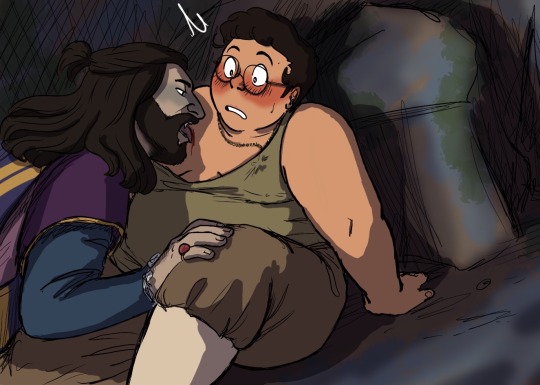
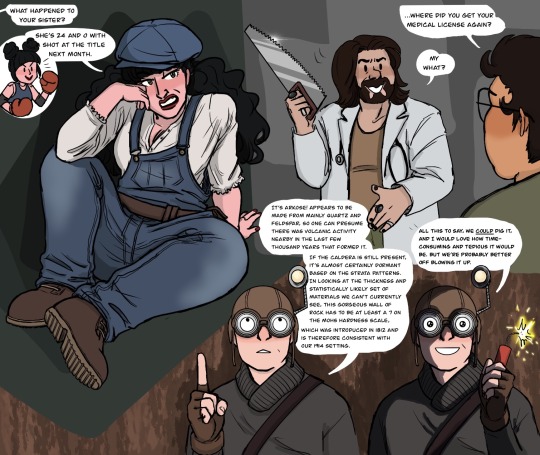
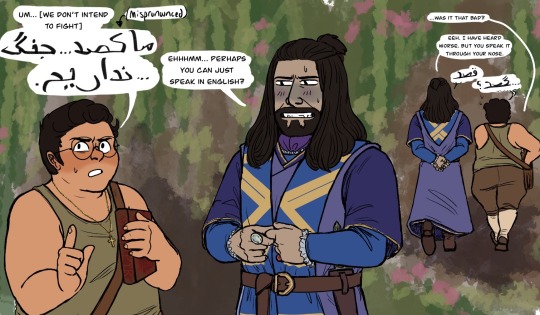
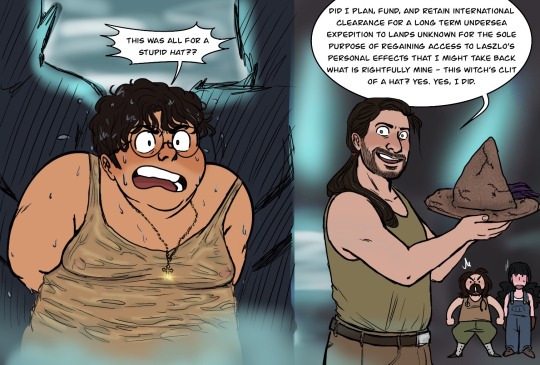
MORE ATLANTIS AU...
ty to @gerandor for the persian translations <3
(ID in alt and under cut)
ID: 1. Full body of Guillermo, dressed like Milo Thatch from Atlantis in jodhpurs and a tank top, sitting up against a mossy rock. The crucifix around his neck is tucked to one side under his shirt, and the strap on the opposite side is shrugged off his shoulder to reveal a small cut under his collarbone. Nandor, dressed in an Atlantic version of his usual outfit in purples and blues, leans in over him, one hand braced on Guillermo's knee, to lick the wound. Guillermo is startled at this, turning bright red.
2a. Full body of human Nadja dressed like Audrey in overalls, boots, and a flat cap. She is lounging on the ground, one elbow braced on her knee to lean her knuckles on her cheek. A voice offscreen asks, "What happened to your sister?" Nadja replies casually, "She's 24 and 0 with a shot at the title next month. In a separate bubble is a smal drawing of Dolly with her hair in twin buns, wearing a sports bra and boxing gloves. 2b. Waist up of human Laszlo dressed as Sweet, in a white coat with a stethoscope around his neck. Guillermo, the side of his face visible in the foreground, nervously asks, "...Where did you get your medical license again?" Laszlo looks at him with a confused grin, holding up a shiny metal saw in his hand, and responds, "My what?" 2c. Bust of Colin Robinson, dressed as a mixture of Mole and Vinny in a gray turtleneck, brown fingerless gloves, and leather bomber hat with goggles and a lit flex light, on a striated brown background. He is holding up one finger and explaining, "It's arkose! Appears to be made from mainly quartz and feldspar, so one can presume there was volcanic activity nearby in the last few thousand years that formed it. If the caldera is still present, it's almost certainly dormant based on the strata patterns. In looking at the thickness and statistically likely set of materials we can't currently see, this gorgeous wall of rock has to be at least a 7 on the Mohs hardness scale. Which was introduced in 1812 and is therefore consistent with our 1914 setting." 2d. Repeat. Colin grins, eyes going large and excited as he holds up a lit stick of dynamite and declares, "All this to say, we could dig it, and I would love how time-consuming and tedious it would be, but we're probably better off blowing it up."
3a. Waist up of Guillermo on a foresty background of hanging lichen and persian silk, a satchel slung across his shoulders and an old book titled 'vampyr' clutched to his chest. He has one finger held up in his free hand, looking upwards in concentration as he attempts to speak in persian. He says ما قصد جنگ نداریم, meaning "we don't intend to fight," but mispronounces قصد (ghasd) as کصد (kasd). Nandor, standing in front of him and fiddling his fingers together, grimaces at this and says "Ehhhmm... Perhaps you can just speak in English?" 3b. Full body from behind as they walk away together, Nandor with his hands held loosely behind his back and Guillermo stuffing his book back into his bag. He asks, "Was it that bad?" Nandor replies, "Eeh, I have heard worse. But you speak it through your nose." He then repeats (ghasd) with proper pronunciation, which Guillermo attempts to emulate but pronounces even more incorrectly as گصد (gas).
4a. Waist up of Guillermo on a misty background, soaking wet with his tank top clinging to him and his crucifix shining around his neck. Two shadowy figures at each shoulder are holding his arms behind his back. Guillermo struggles against them and shouts angrily, "This was all for a stupid hat??" 4b. Knees up of human Simon the Devious as Commander Rourke, dressed in a green tank top tucked into khakis. He is holding up the witch's skin hat reverently in both hands and turns his face toward Guillermo with an unhinged grin, eyes wide and fully out of touch with reality. He replies, "Did I plan, fund, and retain international clearance for a long term undersea expedition to lands unknown for the sole purpose of regaining access to Laszlo's personal effects that I might take back what is rightfully mine - this witch's clit of a hat? Yes. Yes, I did." Behind him, Laszlo and Nadja stand in shocked anger and resigned irritation, respectively. /end ID
#wwdits#nandermo#mlm#atlantis au#guillermo de la cruz#nandor the relentless#nadja of antipaxos#laszlo cravensworth#colin robinson#simon the devious#what we do in the shadows#what we do in the shadows fx#my art#fanart#image described
739 notes
·
View notes
Text
Saving your tags:

My geo professors told me (otherwise uncited) that the number one killer of geologists in the line of duty was ... getting hit by cars as they crossed the highway to look at road cuts.
Side effect of archaeology that i didnt realise WAS a side effect of archaeology #1482
turns out i cant stop staring at the ground when walking across a paddock and could be staring at the sunset instead
(and no, i dont mean ‘dont trip and fall’ occasionally keeping an eye on your feet, i mean like gave myself a crick in my neck automatically scanning for artefacts level staring at the ground)
966 notes
·
View notes
Text




strata cut animation from the music video for Big Time by Peter Gabriel (x)
#peter gabriel#big time#strata cut animation#music video#gifset#the hotdog morphing man is my absolute favorite
4 notes
·
View notes
Text
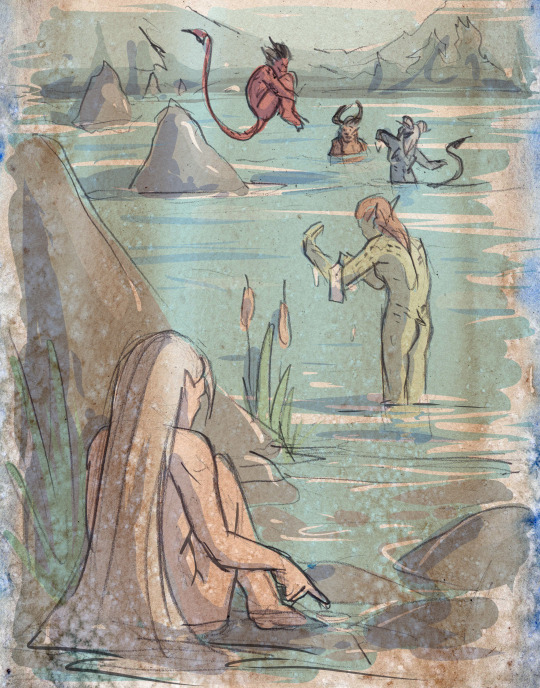
At some point between Moonrise and Baulder's Gate - the crew stops to clean up a bit, and I have an excessive amount of thoughts about social bathing as it applies to the tadfools:
Baulder’s Gate features several bathhouses (including the landmark location Hissing Stones) and they seem geared to a wide variety of clientele; pragmatic (bathing), personal (social and solicitous), and political (a place of meeting) – it can be assumed that group bathing is a norm in the city at all social strata, although wealthier private residences also undoubtedly feature private bathing arrangements. Gender divides do not seem common in Baulder’s Gate on a whole*, and co-ed bathing could likely be a norm as well.
Individual headcanons below the cut - your mileage may vary, this is pulled roughly out of D&D lore, a few character interactions, thoughts about Roman baths, and my ass;
Tav – From the lower middle class of Baulder’s Gate, she grew up with normal family outings to the bathhouse to clean and socialize. In the monastery, cohabiting with a variety of people, group bathing was also a norm (also just… hanging out on a hot day with your buddies or whatever.) Her order views the body kindly, though not worshipfully, and does not view it as a vehicle of shame. It should be cared for with attention and thought to best use it, and while pleasure is inherent (and unshameful) to human nature it is not fundamentally a part of just being naked. She finds nothing out of the ordinary to toss off your clothes and jump in the river with your buddies.
Karlach – Also from Baulder’s Gate’s lower social strata, she too grew up using bathhouses as a place to get clean, have some fun, and be extremely bored while your parents caught up on the gossip. Similarly, working for Gortash meant the occasional political meeting at the Hissing Stones or other locations (a place you CERTAINLY want to take your bodyguard – although she wouldn’t get to enjoy the bathhouse while working). Living in Avernus for a decade in a militaristic setting has also thrown off her sense of normalcy – if you ever get a chance to clean up there (extremely rarely) you take it whatever the circumstance may be. She’s happy to get naked, get in the water, and get clean whoever the company is. (As little children, both Tav and Karlach had to be actively removed from fountains, the river, and suitably large puddles when they presented the opportunity to be in the water – which both of them love.)
Shadowheart – Sharans and the enclave she is from seem to have some issues with pleasures of the flesh and see them as negative and to be shunned. Life is misery and pain and you better get used to it through daily practice. Given her lack of memory of any childhood normalcy, any time spent around other people in a casual way is long gone. She does not seem to have come out of it with bodily shame herself, but undoubtedly finds the idea of just being comfortable with nudity in a platonic way to be alien. Given that she can’t swim, it adds another layer of discomfort being in the water. It takes her some time to warm up to jumping in the river with the others, but she does come round, although she sticks to the shallows until she learns to swim.
Lae’zel – Githyanki don’t seem to have any shame about bodies, at least given their various styling of armor and clothing. Given their almost eusocial social structure and militaristic culture, it’s unlikely there’s much stigma over the body or that of others. She’s certainly with a peculiar group here, but whatever, you need to get the blood out of your hair eventually – the others are sort of strange-looking to her eye for a while though (Shadowheart, Gale, and Astarion seeming like the frail offspring of some small animal with their soft pinkness, Karlach, Tav, and Wyll resembling more of carapaced insects with their ridges and horns.)
Gale – While Waterdeep has it’s spas, these seem more places of relaxation and retreat rather than practical bathing establishments (he does like a nice relaxing treatment – in a robe of course.) Gale has spent so long cooped up in his tower having a weird relationship with the goddess of magic that the idea of just… casually being naked with other mortal people is probably completely off his radar. It is not culturally or personally familiar to him, and feels a little uncouth. He’s going to find a reason to go cook and then clean up by himself later.
Astarion – Speaking of any sense of normalcy having been long gone, his only real use of Baulder’s Gate’s bathhouses has been picking up victims for the last couple centuries (almost always in a sexual context.) Approaching casual bathing with others as any kind of normal is something that will take a reserved approach and a lot of patience as with most things with him. He’s snarky and weird about the whole thing, but it’s to be expected. He later more politely refuses as he works on boundaries and sorts himself out – there’s not enough time in game to sort this shit out. Plus he smells a bit of death no matter what he does – apart from physically getting stuff off his body he’s more reliant on perfume than bathing to feel clean.
Wyll – From Baulder’s Gate and used to playing around wherever he feels like it, it’s not foreign to him to enjoy a bathhouse or river romp (especially in light of various political bargaining happening in the baths) but being from the upper class of Baulder’s Gate he’s not the most casual about it. In his time away from Baulder’s Gate, and being as young as he was, he’s become a little sensitive about it, given his gentlemanly approach developed through his time in the wilds. Still though, it wouldn’t put him off, prior to Mizora’s transformation of him, at which point he’s got body image issues to work through before he’s comfortable again. The tieflings (Karlach and Tav) try to be re-assuring but they come on a little strong about it (hard not to – what he’s viewing as demonic punishment they view as normal for their own bodies – horns and ridges and all.)
Halsin – Look we all know the man likes to be naked and “one with nature”. Bodies are normal and being naked is natural. He’s not caught up on anything, although he might be literally a bear about it if he’s comfortable.
Jahira – Another Baulder’s Gate native who’s used to the city’s amenities. She is much too old and much too traveled to be fussed about who’s around at the evening wash up. She might pretend to be offended or ruffled (or too casual) if she thinks it’s funny – otherwise she’s too busy soaking her joints to care.
Minsc – Minsc is just happy to be here. Are we bonding by bathing together? Ok! But be careful of Boo – he is a delicate creature and gets very angry if he gets soap in his eyes.
Minthara… wasn’t in my playthough, sorry. But I’m certain she’d have the opinion that it’s normal for the ladies to socialize and such while washing but involving the men is bizarre and tasteless.
*Given the normalcy of non-binary, trans, and intersex bodies and identities in BG3, which I personally love.
129 notes
·
View notes
Note
What is the origin (and meaning) of the flag adopted by the Second Spanish Republic? The choice of colors seems rather unconventional to me...

The purple stripe was adopted officially by the second republic as a nod to Castille, a big region in the middle of Spain:
Hoy se pliega la bandera adoptada como nacional a mediados del siglo XIX. De ella se conservan los dos colores y se le añade un tercero, que la tradición admite por insignia de una región ilustre, nervio de la nacionalidad, con lo que el emblema de la República, así formado, resume más acertadamente la armonía de una gran España
Translation:
Today the flag adopted as the national one towards the mid 19th century is folded. From it, the two colors remain and a third one is added, which tradition takes as the insignia of an illustrious region, nerve of nationality, and therefore the Republic's emblem, thus formed, contains more accurately the harmony of a great Spain.
The purple as a symbol of Castille comes from a misunderstanding of what the 1520 revolt of Comuneros used as a symbol. The color of Castille has always been described as crimson, which is sometimes confused to have a more purplish hue. While it has been shown the Comuneros used a red cross as opposition to the imperial white cross, popular wisdom was that they used purple, and it gradually became an actual color used by Castillian regionalists.
Note on the Comuneros, Castillian regionalism, and some trivia about the Republic's coat of arms under the cut:
The revolt of 1520 happened in the context of emperor Carlos 1st (5th of the HRE) barely speaking the language, favoring politically and financially the Flemish court with the wealth extracted from the Americas, and also funding very expensive wars that didn't even have anything to do with the Crown of Spain. He was also a corrupt monarch who raised taxes. Both the nobility, which wanted more participation in governing, and the merchant/middle strata (including an embryonic bourgeoisie!), which were being overburdened with taxes, revolted against the king. The focus of the revolt and where they had more strength was in Castille, and one of the forms of territorial organization of the Crown of Castille was the Communities, which is where the name comes from. The people who participated in the revolt as well as the modern political movements that claim to descend from them (more on that later) are known as Comuneros, which I'd translate as Communards.
I won't go into very much detail, and this is still a debated topic. The character of the revolt had many axes, one of which was the more popular elements (peasants, bourgeoisie, artesans, merchants, etc), to the point that it is considered by some to be some of the first if not the first attempt at a bourgeois revolution in Modern Spain, another was the more opportunistic axis (fiscal reform, the nobility, etc.). What matters is that a very strong narrative has grown around the 1520 revolt, beginning in the Golden Era of the 17th century and its literature, that of a popular revolt and of a relatively old and legitimizing ancestor for the popular movements in Castille.

This is the Comunero flag nowadays, notice the purple field as a reclamation of this color as a Castillian symbol. What's of more interest to me is the following flag:

This flag and the movement it represents, Izquierda Castellana (Castillian Left) emerged after the end of the dictatorship, not as a separatist kind of regionalism, but as one that appreciates the history and culture of Castille. The red star is a very overt influence from communists and socialists, which are, as far as I'm aware, quite present in Izquierda Castellana.
So purple in Spanish politics has been, ever since the ~16th/17th century, associated with the popular movements and tendencies of Spain, particularly those in the peninsula's center. It became even more cemented in this role after the Second Republic adopted it, sort of hitchhiking the much bigger Republican tendencies.
The Second Republic's coat of arms subtitutes the monarchich crown for a castle in the shape of a crown, both as another nod to Castillianism and to symbolize the replacement of the monarchy for the people themselves

In the short life of the Republic, its symbols found their way into a lot of places or replacing old symbols, and almost all of them were destroyed during the dictatorship. The most prominent exception is the facade of Madrid's main train station, Atocha (originally named Estación del Mediodía (midday station)):


Notice it perched on the clock? I don't know if it went unnoticed, or if they did not care enough (unlinkely). It is possible it went unnoticed because I can't find information on it. Other examples of this castle-mural crown remaining in Madrid are:

This lightpole right in front of the Royal Palace

And this massive coat of arms on the facade of the Bank of Spain
64 notes
·
View notes
Note
Say, do you happen to have records of products and other objects your residents used to manufacture or make? Something such as this brand of drinks perhaps?

I don’t have any records of this beverage in my archives, this one in particular might be from a faraway region. The distances between iterator cities often led to them developing very unique cultures, and food and drink such as this were based primarily on what food sources were native to the surrounding area, as well as what could be cultivated in the cities’ automated farm arrays.
My city, Zenith, was primarily a destination for scholars seeking to advance their knowledge, but over time it also began to attract a modest amount of tourists. People often traveled to the city because of its unparalleled views of the night sky. Many of the items offered by local merchants took on a celestial motif in an attempt to appeal to these visitors.
One item that I recall being popular was a form of candied Lilypuck. When shucked and cut into slices, the plants appear vaguely star-shaped. Lilypucks also have a form of bioluminescence, which fades after the fruit is picked. They were prepared fresh and offered to stargazers, who enjoyed the novelty of the way Lilypucks glow in the darkness.

Despite the appeal to tourists, the extreme climate of my location deterred many visitors. The cold could be dealt with by dressing appropriately, but a larger shock to newcomers was the thin air. Those traveling from lower altitudes often had trouble acclimating to the air's depleted oxygen content, resulting in sluggishness and exhaustion, and even injury. Eventually the High Council began to mass-produce masks to provide the wearers with supplemental oxygen in order to mitigate the effects of altitude sickness.

The masks used Bubble Weed as an oxygen source. The plants were suspended in water tanks and attached to the wearer's air intake. Some of the masks manufactured by the High Council were very ornate, made in an effort to appeal to the upper class. These more elaborate masks were often only accessible to wealthy individuals who visited; usually these were foreign politicians or famous visiting scholars.
More lightweight and affordable masks were also available. These were less elaborate and more utilitarian, and were often used by members of the working class, as well as children. They were considered more comfortable and offered a higher range of motion because they didn't cover the entire face. However they were also frequently considered uncouth by members of the upper classes for this reason.

A popular activity among younger tourists was a challenge to see who could climb up the city’s central Vertex Spires the fastest, often using supplemental oxygen as an aid. Many individuals ended up injuring themselves in the process, and the High Council eventually banned the practice out of caution. However, it is to my understanding that this only made the game more enticing to the youth, and it persisted despite the Council’s efforts to lock down the Spires to prevent trespassers. I assume it was seen by many as a rite of passage or a dare. I... can't say I approve of this activity, but I was unaware of its practice until I read about it in my copy of the High Council's archives.
When my citizens were still here, I paid little attention to their daily activities. Their lives were recorded by citizen ID drones and my Overseers, and I only received reports of notable events that required my attention. The rest of the information was processed by background subroutines in my low-level processing strata, and was heavily moderated by the High Council of the House of Spheres. Recordings I lacked the time to examine were stored in the Council's archives for later perusal.
I appreciated the lack of distractions. Now that Zenith’s residents are gone, however, I have access to everything, and more than enough time to examine it all. I used to care very little about the culture of my citizens, but the more qualia I analyze, the more I am realizing what a rich tapestry of life had been woven through my city streets.
….
I am beginning to regret allowing the House of Spheres to moderate access to my own citizens so heavily. Their lives seemed so trivial and insignificant back then, but the city seems barren and lifeless in their absence.
#ooc: thank you for giving an excuse to ramble about Zenith's culture lol#for most of their life tsac preferred to be left alone.#but with their citizens gone and global communications decaying that isolation is becoming less and less appealing#communications manifest#rain world#iterator oc#three stars above clouds#rw oc#iterator ask blog#rain world iterator#also full disclosure the mask-off ancient is heavily inspired by spotsupstuff's designs. I really like their interpretation of ancients
35 notes
·
View notes
Text
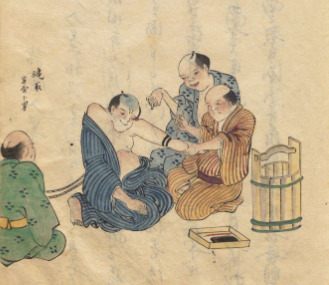
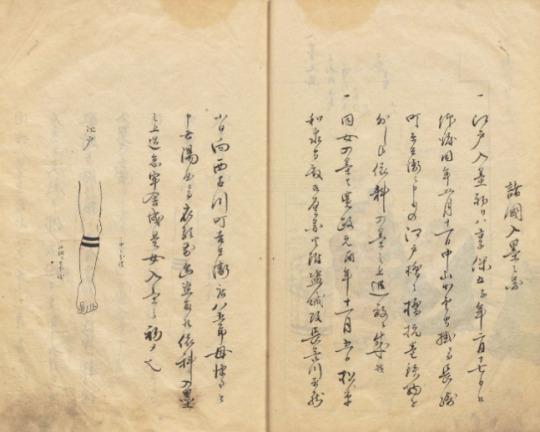
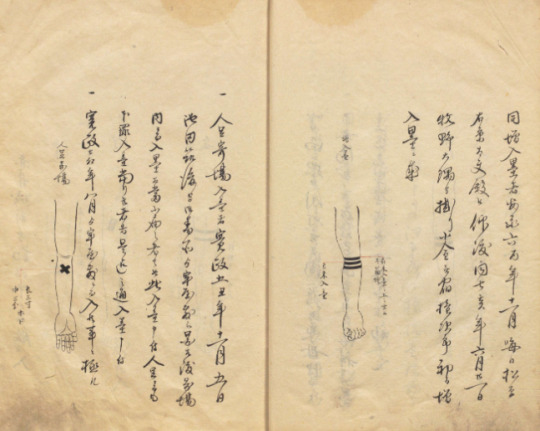
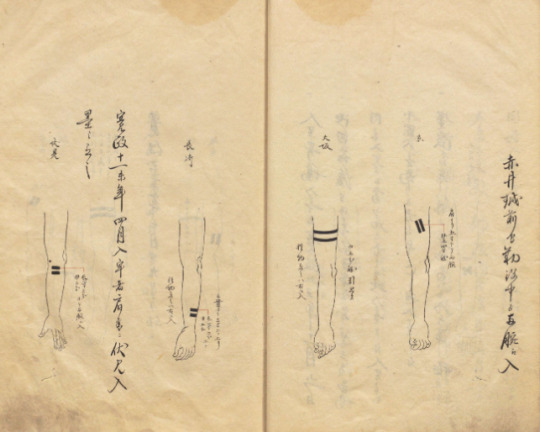
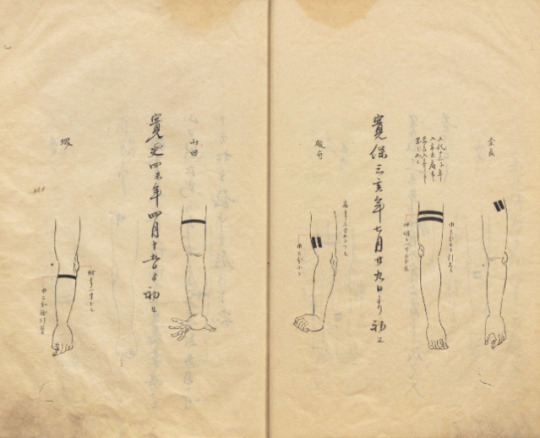
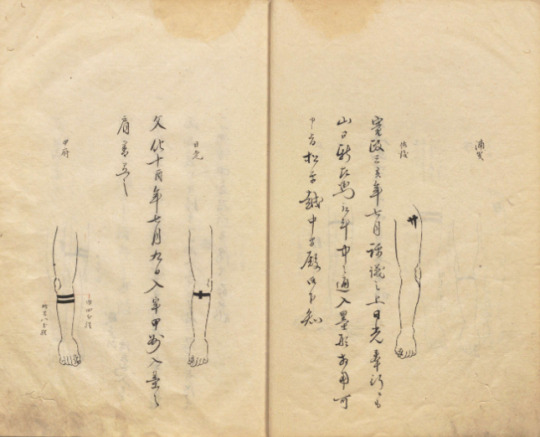
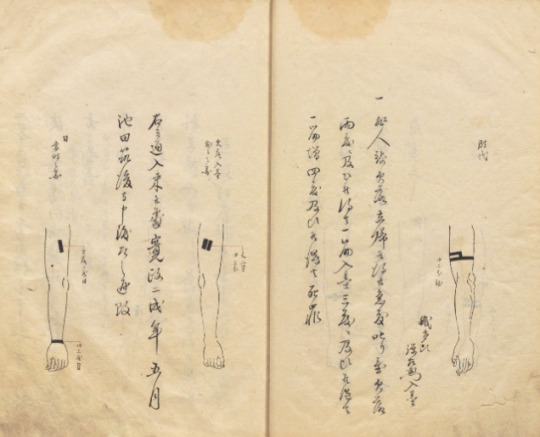
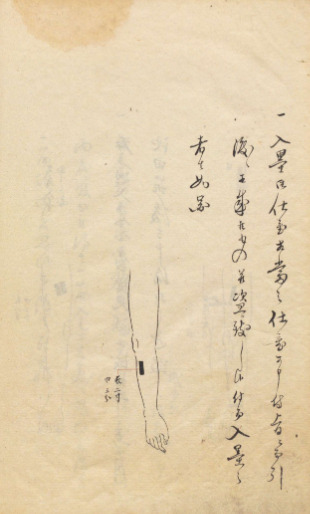
Irezumi kei (tattoo penalty) as depicted in the [徳鄰厳秘録 - Tokuringenbiroku], a kind of penalty instruction book compiled in 1814, digitalized by the National Archives of Japan.
CW for this post about Edo period judiciary => mentions of physical punishment, torture, death penalty (text only, no details, no graphic illustrations) . The irezumikei pages above are p.19 to 25.
I won't reproduced the illustrations here, but the Tokuringenbiroku book also presents other Edo period "punishments" and death penalties, like different types of goumon (torture), gokumon (decapitation and exposure of the head to public view), kakei (stake), haritsuke (crucifixion), or tameshigiri (sword cut testing, here on executed convict corpse). Please proceed to the full book according to your sensibilities!
Back to irezumi kei : the markings of character Akaza (from Kimetsu no Yaiba/Demon's Slayer) are directly inspired by those, same for Mugen in Samurai Champloo for example:

After Tokugawa Yoshimune's reforms abolished bloodier punishments (nose or ear cutting) for lesser crimes (like theft, gambling or fraud), irezumikei spread, inspired by Chinese bokkei practices.
Yet, zainin (lawbreakers) were also often beaten or whipped (tataki), which could be a "light" sentence or more far extreme one. Women tended to be imprisoned instead.
Punishment tattoos also often went alongside tokorobarai (banishment), which had several levels depending on the crime. You could be banished to a remote island, just away from your city, or forbidden to enter a certain perimeter.
Exile is why different areas had different marks, placed on the arms or faces, easily identifying the person as a criminal convicted in another region.
Number of lines or dots were often used to symbolize repeated offences (pic below source). Most of the times, getting 3+ irezumikei could grant you death penalty.
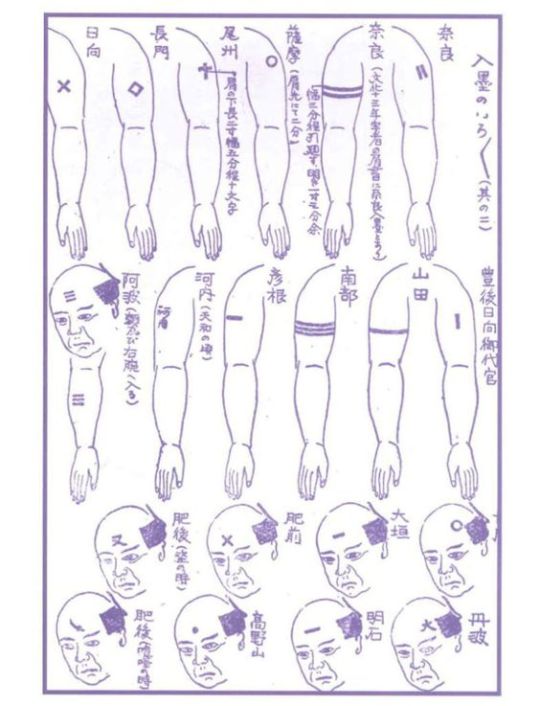
Irezumikei maybe be why criminals came to use extravagant tattoos, as to cover their infamous marks, leading to the yakuza association with body ink.
Yet, other strata of population also favored figurative tattoos, so the link between criminals and tattoing in Edo period is not self-evident.
Some shapes of -sode (sleeve part of a tattoo) for example left arm interior bare, maybe to prove then that no armband tattoo was hidden underneath a bigger design.
#japan#japanese history#Edo period#crimes#judiciary#theft#fraud#cw: physical punishment#cw: torture#cw: death penalty#irezumi#Japanese tattoo#horimono#irezumikei#criminal tattoo#yakuza#tokorobarai#tataki#gokumon#kakei#haritsuke#tameshigiri#徳鄰厳秘録#Tokuringenbiroku
328 notes
·
View notes
Text
Daughter of mine III
Turpin-o-Lantern

Pairing : Judge Turpin x Daughter OC
Summary : Richard Turpin, the High Judge of London, decides to create his own Halloween tradition in the hopes of getting closer to his daughter.
Tag(s)/Warning(s) : A bit of angst. Mention of prostitution and death. Mention of children being beaten. Awkward father. If I forget something, please mention it to me !
A/N: Hello dear 😁 I promised you Turpin for Halloween and here it is ! I didn't proofread it, therefore sorry for any mistake you encounter.
Part I - Part II
Also read on AO3

Turpin wasn't a man fond of disturbances in his town. Fortunately, they didn't happen often. Except for that damnable Christmas, which inevitably returned every year.
Richard despised Christmas, a celebration full of painful memories from his childhood, between a violent dad, an indifferent mother and the hypocrisy of people during that said warm celebration.
In his family, Christmas wasn't about sharing meals, basking in the company of loved ones, or exchanging gifts by a crackling fire with sweet treats, hot chocolates and warmth laughter. No, for the Turpin's familly, the celebration in their towering manor was an exercise in appearances.
The household staff meticulously decorated his parents' estate, attending to every detail. A huge tree would pe positioned in the entrance hall, though neither Richard nor his younger brother were ever permitted to decorate it. As the sons of an earl, participating in such frivolous activities was beneath them.
Once, while he was only 6, he had the misfortune of breaking a glass ball while trying to observe it and his father, rather than worrying about the cut on his hand, punished him with a belt.
On the night of the grand party, the boys were confined to a separate room with their governess, far from the festivities. Richard would never forget that night during which, his brother and him had escaping the vigilance of the old governess to watch the guests in their finery from the grand staircase. Unfortunately for them, their fathers had caught them, which made them earn a beating on the spot in his study and a second from the governess, who was not at all maternal and who had punished them at length with her oaken switch, making them laid down on their bed and hitting again and again, scolding them for having dared disobeying her and arousing their father's anger towards her.
That was all Richard had known as a child. Beatings. Beatings from his father, beatings from his governess who was allowed to beat him and his brother as she pleased, and the indifference of a mother who looked away every time her husband unbuckled his belt or the governess made them bend over.
As they grew older, they were grudgingly allowed to attend the party, but in silence. Children, after all, were to be seen, not heard, and in their case, being heard during that awfully incredible party would have mean more bruises.
But, as if this wasn't enough, since the last teen years, a new festivity had taken place in the stress of London and was quite popular, for Richard biggest desperation : Halloween.
Not Samhain, the old Celtic celebration from which it was inspired, but Halloween, a terrible affront to the ancient pagan festival, coming straight from America. Indeed, some settlers who had come back to their old England had brought back with them that stupid new cutom. Not that Richard was particularly fond of the pagan festivity either, but at least, it meant something more important for people who had and was still celebrating it... away from his town.
This Halloween was nothing short of a vulgard carnival for children during which they were wearing ridiculous costumes and scouring the streets for sweets.
Richard couldn't understand how this festivity had captured so quickly the enthusiasm of London's populace across all social strata. Not even his peers in the high society escaped the ridiculous celebration.
Not that it was really disturbing during the day as people had to work as usual, but as soon as day turned into night, he had to tolerate stupid children running amok all around London with their even stupider parents.
Fortunately, none of them was foolish enough to come near Turpin's manor. After all, the gloomy venue was as intimidating as the man living there. But just the fact to know there were people adopting that foolish celebration coming from another continent, America for God's sake, was enough to annoy him. Yet, truth be told, Richard was easy to annoy.
However, for the first time, he had a child living in his mansion. A child who knew what Halloween was, even though she didn't mention it to anyone, neither to her governess, a kind woman, strict but always fair, that Richard would have sent to the depths of the Australian bush if she had dared to beat Catherine. The child was so quiet that she didn't even dare asking for things. She was still a tad shy around him, even if she talked with him a little bit more.
Catherine had only recently begun opening up to him, addressing him as "father", a title he found he didn't mind in the least. Though, he was uncertain of how to be the father he aspired to be, he knew one thing : he would not be the father he resented from his own childhood.
Never Catherine would know the sensation of his belt on her back or of the switch while she would be humilated, bending over and enduring blow after blow as he had done so many times.
As Richard strolled through the courthouse that morning, his mind wandered to that little girl and her big green eyes. Though, his attention was soon interrupted by The Beadle, scurrying along to keep pace with his master's long stride without realising that his employer wasn't listening at all.
"So, my lord, do you agree with my proposal ?" the man inquired, his rodent-like face eager for approval.
Richard raised an eyebrow, barely concealing his impatience.
"Which proposal ?" he asked dryly, his tone sharp as a blade.
"The one about the young child who stole a piece of bread, sir" The Beadle replied, his confusion mounting.
"Yes. No !" Richard, finally, dismissed him brusquely, "We'll need more time to consider the sentence here. But not now. Now, justice must be served !" he said ceremoniously.
And with that said, Richard headed off towards the Court, where a long day was awaiting for him.
Halloween, thankfully stayed away from his thoughts and the little curly hair girl in his mansion, even though not totally forgotten, was on the back of his mind for the rest of the day, too busy listening to buggler, impeachment and neighbor fighting about a goat as they couldn't decide to who the baby the goat was carying will belong to once they come into the world, as the male goat belonged to one and the female to another.
This last case irritated him particularly and he decided to hang the goat for adultary.
He was far beyond annoyance when he finally left the Court. Unfortunatelly, there was as many trivial cases to administer as there were criminals to hang, thieves to cut off their hands and petty criminals to send away in Australia.
But as he was walking in the street, his gaze fell on a father who was holding his daughter's hand. The little girl dragged him to a pumpkin seller with a huge smile on her face.
"Look dady ! This one would be perfect !" said the little girl, tugging excitedly at her father's sleeve, her eyes alight with joy.
Turpin felt his heart tighten in his chest when he saw the look of happinness both, father and daughter, shared. The dad, clearly eager to indulge his child with a mere pumpkin, bought it with a little grimace and Richard understood that the man was probably sacrificing his meal for the rest of the week just to make his daughter smile.
Richard would never have dared to ask his father for anything. He had to be content with what he received and he was happy when it was not a correction. But suddenly, his mind wander away as an unexpected thought came up to his mind. Maybe Catherine would enjoy such a simple pleasure. Actually, he had no idea if she even knew what Halloween was. Elena was poor, she probably couldn't even buy enough food for both of them, therefore something as expensive as sweets and pumpkins was unthinkable. Besides, she was a whore, likely spent such nights working while Catherine was locked up, alone in the dark. Surely she had no inkling of Halloween and she couldn't miss something she didn't know.
The idea to make her enjoying such a simple pleasur tugged at him, prompting him to take action. Catherine was still young, innocent and he wanted her to experience a pleasure of her age, pleasure he was denied as a child, forced to grow up too fast. He knew even little ladies and little lords enjoyed that festivity and it's how he found himself, The Great Judge Turpin, purchasing a pumpkin on his way home, envisioning the surprise on Catherine's face.
When he arrived in Turpin's Manor, his butler's face, shocked and perplex, was priceless, but the man was wise enough not to pipe a word.
But once in his office, the cucurbitacea sitting on his desk, he felt somewhat fatuous. What was he meant to do know ? He had no idea. Should he call Catherine, present it to her ? After a long moment spent to deliberate what to do, he summoned the head maid. Anne had to bit her lips to prevent a laugh from escaping her mouth at the sight of her master in front of that humongous, horrendous, orange pumpkin.
"It's for Catherine," he said, his voice cold.
"Of course, my lord," said Anne with a smile, staring at the monstrosity before adding, "But I'm not certain the young lady would appreciate it for supper. Her taste are as picky as yours, my lord."
"The old goat" thought Richard. She was teasing him without even trying to hide it. He throw her a cold look, one who could have made shiver everybody else but not her. Anne remained unperturbed, her years of service had accustomed her to his change of mood.
"Anne, if you value your position here and if you want to have a roof above your head tomorrow, refrain from testing my patience,' he warned.
Anne's face softened, her tone now thoughtful.
"My lord, it is thoughtfull of you, but I'm afraid Catherine doesn't know what Halloween is. I overheard the young lady talking with her tutor, Mister Brandon this afternoon and she doesn't know what was the celebration about. She even admited never having eaten such deliciousness as sweets before living with us."
This revelation only confirmed what Richard already suspected.
"However, Mister Brandon offered her a book about Sahmain and she seems to like it, even though she doesn't understand everything. Maybe, my lord, could you read it with her ?" she suggested wisely.
Richard thought for a moment. It seemed insane to him, but he suddenly remembered all those times he had asked his mother to read him a story, to comfort him after his father had finished what he called "a disciplinarian lesson" with him, and the disappointment every time she refused. He had never tasted the simple comfort of his mother's arms and when she spoke to him, it was always reverently, as if he was just a stranger to her.
He didn't really know what he wanted from his fragile relationship with Catherine, but he knew she was so alone and lost in that big mansion and he had heard her crying a few nights ago. When the governess had come to comfort her, she had told her that she missed her mother and he was sure that Elena was the kind of mother who told stories.
After all, she had played a good trick on him when she had abandoned him overnight without explanation so that he found himself six years later with a daughter he didn't even know he had.
"Yes, maybe," he finally said. "But what about the pumpkin ? Apparently, we need a pumpkin. Parents were buying them left and right".
Anne's lips twitched as she held back another smile.
"You might carve it with her, my lord," she suggested.
Richard frowned, feeling utterly lost and he didn't like the feeling. He had never felt like that since he had left the cursed house where he had grown up. Yet, the arrival of Catherine in his life had begun to alter his perspectives and certainties.
"Well, she'll do that tomorrow with the help of..."
"No," she cut him off, "you should do that with her. I'm sure the little mistress will be delighted."
In which odd and frivolous activity Turpin had just engaged himself ? Yet, he was determinated to surprise the little girl. She never asked for anything and was always so please with everything one's would be willing to give her that he could do that for her.
Therefore, on Saturday, when he came back from the Court in the beginning of the afternoon, he asked Catherine was brought to him.
"Father ?" asked coyly the little girl, while she entered the parlour.
"Catherine, dear daughter," said Turpin, his tone softened at the view of the shy child, "I have a surprise for you."
Her eyes was already glimmering with joy. No one could be blessed with a more grateful child than him and it made him smile. A discreet smile, nothing to ostentatious. He was Richard Turpin, after all. He asked Catherine to follow him to the backyard, where the pumpkin was waiting for them on a wood table.
"A pumpkin ?" asked Catherine, uncredulous.
Turpin didn't know if he was amused or saddened with her innocence, while the little girl didn't know what she should do with it. Did her father expect her to learn to cook ?
Taking pity on his daughter incomphrension, he explained her it was for Halloween. She smiled so widely that it could have been hurting.
"I do not know a lot about it," she confessed shyly, "mom was never home on this day and she didn't want to read me book about it because it was about ghost and she was worried I couldn't sleep at night," she rambled, lowering her head.
It was probably wise from Elena, thought Richard. Catherine was afraid of the dark, ghost stories would have kept her up all the night, making her startled at the smallest noise. And it was better if she didn't know anything about the sweets things as her mother knew perfectly well she couldn't afford such a frivolous expenditure when her daughter needed real food in her stomach.
"Well, it goes without saying that we're going to celebrate it like the important people we are, not like slum dwellers. That means no stupid door-knocking," he said sternly.
"Why would we do door-knocking ?" Catherine asked innocently.
Good. Very good. The girl didn't know anything about that stupid custom from the America. It was his chance to make up his own tradition by teaching her some history about the real origin of the celebration while doing it like civilised people.
They still could carve the pumpkin if it could amused her, but she wouldn't know anything about that silly door-to-door sweet or threat thing. Catherine wouldn't be like those foolish children. She would learn to celebrate it like a proper lady, with etiquette.
"Are we going to eat sweets, father ?" she asked with wide, expectant eyes.
Of course, she knew about the sweets, thanks to Mister Brandon.
"Of course my dear, we will have some sweets, and probably a cake."
Her eyes twinkled with pleasure. There was nothing she liked more than being spoiled with a cake. It didn't happen often, Richard wanted her to eat proper food to gain some strengths, she had it maybe twice a month and it was always the best day of her life. It was the only moment her governess or Turpin himself didn't have to fight with her to make her finish her plate as she knew the little treat was waiting for her after her meal.
She always took her time to savor each bite of her slice of cake. When she was really well-behaved, which means almost all the time, she could have two slices and another one for the breakfast.
"Father, could you read me a book about it ? Mister Brandon gifted me with one but it didn't talk about ghost."
Richard chuckled, yet he obliged her, leading her to the library. He found the most suitable books for her and explained her why those pagan celebration was an abomination, yet still less than this one coming from America and called Halloween, making Catherine giggled more than once with his theatric, yet engaging talking.
When the night of Halloween arrived, the pumpkin, carved by the butler and a bunch of patient servants, was troning proudly on the little table of the parlour, a candle into it. As promised, Catherine had received sweets and a delicious chocolate cake for the dessert. She had thanks several time Richard for it, so many times that it had started to annoy him, even though far deep inside him, he felt a slight ounce of happiness to have made her smile the whole day.
He was now reading to her while she looked at the flickering candle inside the pumpkin with amusement, until he saw her yawned for the fifth time in less than ten minutes.
"I think it is time for you to go to bed," he said firmly.
"Oh, father, please, a little bit more," she begged.
"No," said Richard unyielding, "it's time for the young well-behaved lady you are to go to bed. Behave child and you'll get more of that cake tomorrow."
"Is it a promise ?" she asked hopeful.
Richard sighed, sligthly amused that it only took a cake to make her obey.
"I promise, now go on, I'm going to fetch your maid," he said, moving towards the rope which allowed the servants to be called.
"Father...," started Catherine, but then clamed up suddenly.
He raised an eyebrow, waving his hand to incite her to continue.
"May I... May I..." she stuttered.
Despite his severe demeanor, he gave her an encouraging look to make her ask what she had on her mind.
"May I ask you to be the one who help me to go to bed," she finally managed to said in such a whisper that Richard had to thank his good ears to have understood her.
Richard looked at her for a moment, but the child kept her eyes down, her cheeks slightly red from daring to ask him such a request.
Touched more than he would have admitted, Richard took her small hand in his. He didn't really like physical contact, probably because the only physical contact he knew as a child was always made to hurt him, but for her, for his daughter, he was willing to make an effort.
"It will be my pleasure," he answered solemnly.
He kept his composure, but inside, his heart had pumped a little bit faster when she looked up at him with the brightest smile he had ever seen. Richard wasn't a demonstrative man, he was authoritative and didn't let room for a lot of goofiness, therefore he knew creating a link with his daughter, even though it had become his desire before he had realised that, would be complicated. Yet, this mere request was like a balm in his many scares owe to a sad childhood and uncaring parents, then by the harsh world he was used to living in.
He awkwardly tucked her in her bed, surrounding her with her plush animals at her demand, almost drowning her under them.
"Isn't it suffocating to sleep like that ?" he asked with a flicker of amusment in his eyes at seeing her engulfed by all the plushes.
"No, I feel safer," she said with a yawn.
"Well, then good night."
He gently kissed her forehead, ready to take his leave, but Catherine held him back by grabbing his hand in a flourish. He arched his eyebrows, questionning her silently.
"Thank you, father. For today. I am happy to have spend my first Halloween with you."
Richard, amazed, was taken aback with her innocent sincerity. It only took a child to make him lost his ability to speak. His heart swelled with a strange feeling he hadn't felt since... well, maybe never to be true. He didn't have time to respond that her hand faltered away as she felt asleep. Richard stood up, leading towards the door, but before closing it, he glimpsed fondly at her one last time.
"Well... You are more than welcome, daughter of mine."
#alan rickman x reader#alan rickman#judge turpin x reader#judge turpin#sweet turpin#sweeny todd#evans23
35 notes
·
View notes